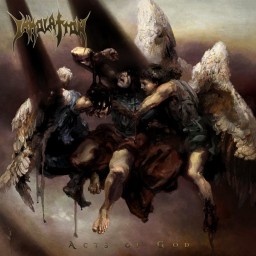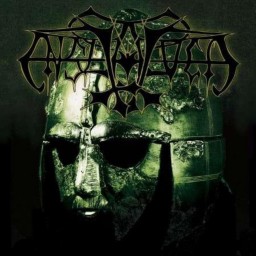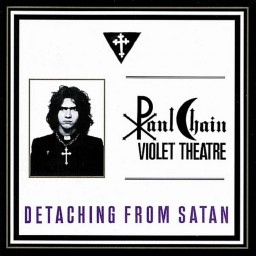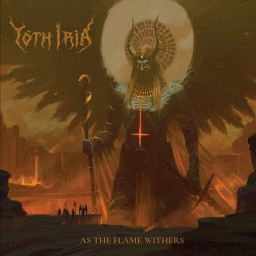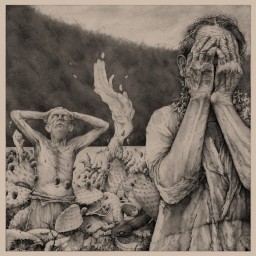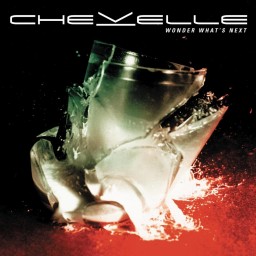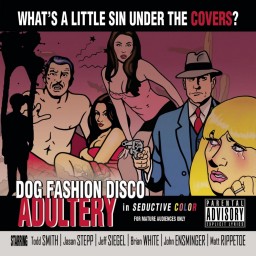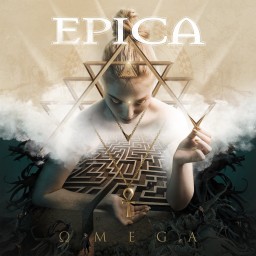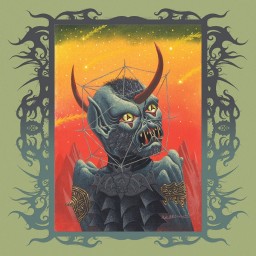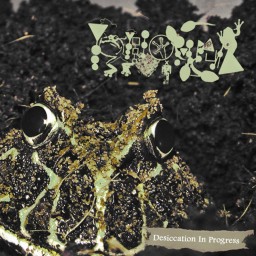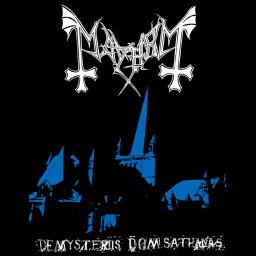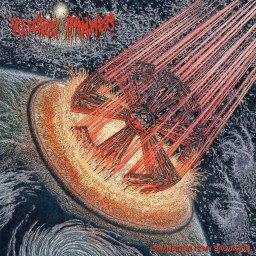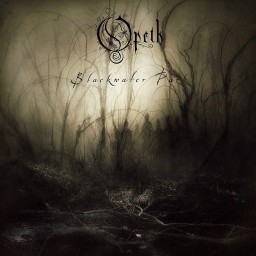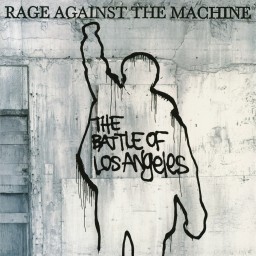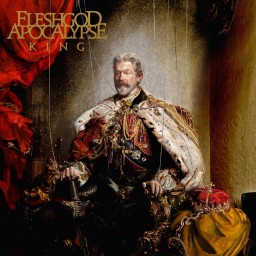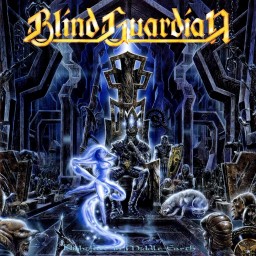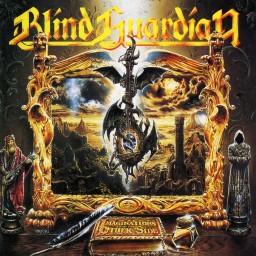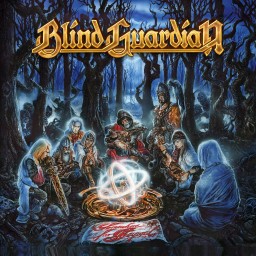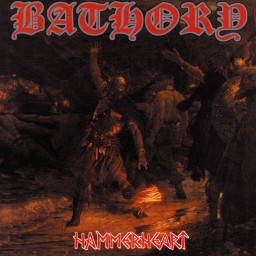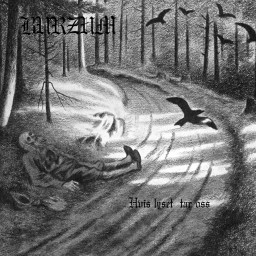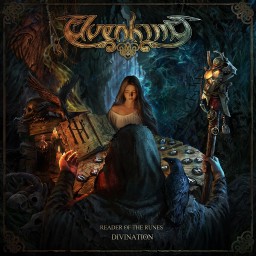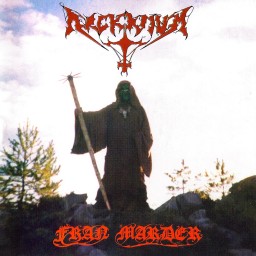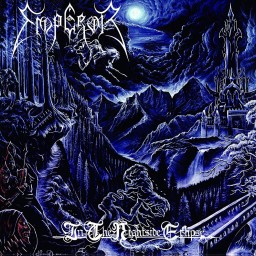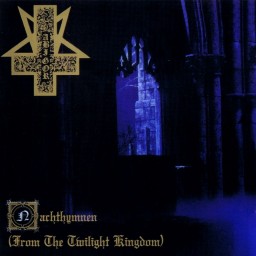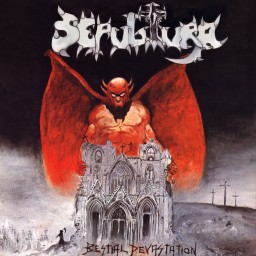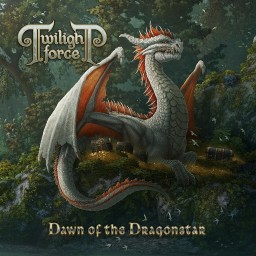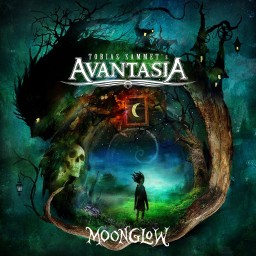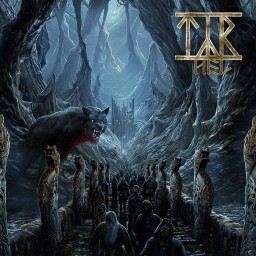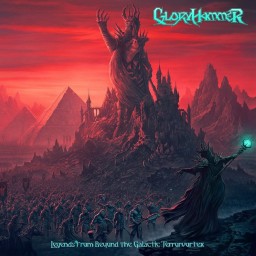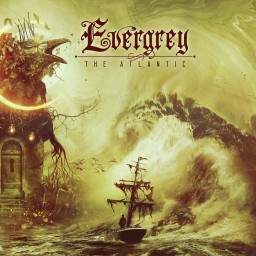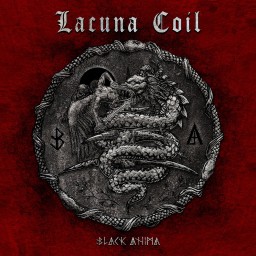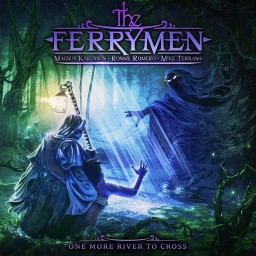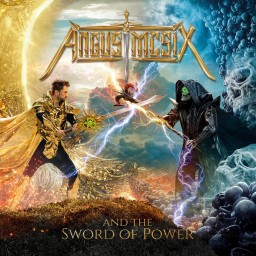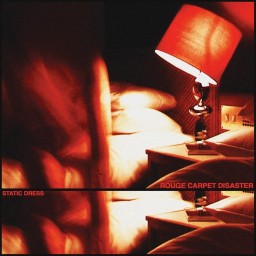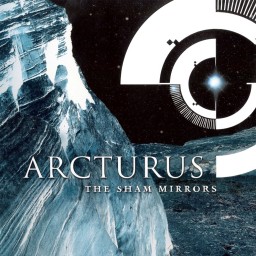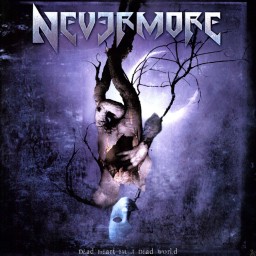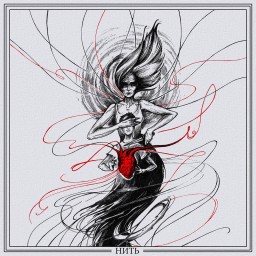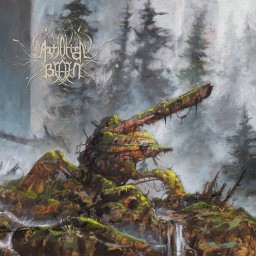Xephyr's Reviews
The Old, Deathly Guard
Death Metal and I have an interesting history in that there’s hardly any history at all. I was painfully unaware of more traditional Death Metal as I started with Opeth and proceeded to trek down the more melodic, progressive, and technical route with bands like Insomnium, In Flames, and Falljuah. It would take me a few years of slowly being exposed to the heavier, filthier, and more rhythm focused Death Metal acts before finally starting to check out some of the classics like Death, Cryptopsy, and Bolt Thrower. So, when I saw that Acts of God had released, I made the horrific realization that I haven’t listened to a single Immolation album released before 2017. Whoops. Normally I’d do my due diligence and go back to do some research, but since Immolation is such a massive name in the genre, I figured it’d be neat to have a unique perspective going into Acts of God.
The lengthy track listing made me a bit wary at the start as I’ve struggled with Death Metal albums that keep the song length relatively short in the past, but Immolation wastes no time in providing competent variety and pacing to keep each 4-minute track fresh. Acts of God feels uncompromising towards the Death Metal genre in the best of ways, as it heavily adheres to the tried-and-true formula while being written and performed so well that it still manages to distinguish itself from other albums that utilize outside elements or gimmicks. It’s dense, chunky, and dissonant as well as melodic at all the right times, but not overwhelming as the mixing and production allows much more breathing room between the chugging guitar and the hammering drums than what’s usual with modern Death Metal production trends. Acts of God has a ton of depth that took me a few listens to pick out as the guitar, drums, and vocal interactions can be really creative and not immediately apparent. I’m especially critical of the more brutal side of Death Metal vocals and while I’ll say that Immolation does suffer from not having the variety in vocals I prefer, I ultimately warmed up to Dolan’s performance towards the end. He has strangely amazing annunciation for how deeply guttural he is, which only adds to the power of his performance that weaves in and out of nicely complementing the riffs to being utterly chaotic. I’ve always struggled with the more brutal and dissonant styles of Death Metal and those portions still trip me up on this album, but the songs are so short and some of the transitions are so clean that it didn’t end up bothering me too much in the end.
Where Acts of God shines is the guitarwork and its interplay with the drumming throughout the entire album, asserting itself as one of the best collections of traditionalist Death Metal riffs through both their compelling simplicity and hidden complexity. In an era where Death Metal acts have evolved to incorporate slews of elements to make their riffing heavier and more gruesome, there’s something about the basics being performed incredibly well that seriously grew on me. Couple that with a drum kick sound that actually adds to the thick, dark atmosphere instead of cutting right through and it creates a ruthless base for Immolation’s guitarists to dig into a variety of riff structures throughout the album. “Noose of Thorns” is the best example of Immolation’s riffing style and how they transition between them, starting off with a more melodic riff that eventually builds and morphs into a chaotic flurry of dueling guitar leads and drum fills before breaking down into a chugging variation on the opening riff before reprising the main theme at the end. All of the other, shorter tunes follow a similar formula albeit with more abrupt transitions that hardly ever miss their mark.
Despite there being a ton of subtle variety within Acts of God, there isn’t enough blatant variety for someone like me towards the middle of the album. While the album starts on a great run of four songs, the section between “Shed the Light” and “Broken Spirit” feels lackluster compared to the beginning and end, despite “Incineration Procession” having one of the stronger opening riffs. “Derelict of Spirit” is an absolutely brutal start to the back portion of the album that eventually closes on their most intricate track “Apostle”, ending the album on an extremely high note. I’m aware of my lack of patience when it comes to traditional Death Metal albums, so it’s not a surprise that Acts of God doesn’t keep me interested for its entire runtime, but it’s a refreshing experience to continue to get quality, no gimmicks Death Metal from one of the genre's classic bands. It may lack the spice that I look for in my modern Death Metal, but this style will always sound timeless when done correctly.
Genres: Death Metal
Format: Album
Year: 2022
A Viking Among The Giants
The early 1990's was a turning point in the story of Black Metal, with throngs of second wave artists crawling out from under the frozen ground of Scandinavia. Norway spearheaded most of this new revolution in Black Metal sound with material from bands like Mayhem, Darkthrone, Burzum, Emperor, and in this case, Enslaved. Personally, Enslaved was always overshadowed in my exploration of classic Black Metal in favor of Emperor, leading me to only check out their 17th studio album E released in 2017 until now. I hadn't realized how close and connected the second wave Black Metal scene was, at least in Norway, until doing my due diligence in figuring out what kind of climate this album was released under in 1994. Vikingligr Veldi comes after a 1993 split with Emperor, which explains the many similarities in sound, and directly in the middle of an absolute bombardment of insane Norwegian classic Black Metal releases. Emperor released their famous In The Nightside Eclipse merely one day before Vikingligr Veldi's February 22nd release, Darkthrone continued their reign over the scene with Transilvanian Hunger which released 5 days before, Burzum's pioneering Hvis lyset tar oss was released in April, and Mayhem's pinnacle release De mysteriis dom Sathanas followed in May of the same year. Since all of these groups are Black Metal titans, Enslaved is probably the least assuming and less known of the bunch, so how does Vikingligr Veldi hold up amidst the gargantuan competition?
The short answer is pretty damn well. The longer answer is that Enslaved's take on a more bombastic and theatrical style of Black Metal falls short of Emperor's signature atmosphere and complexity, but makes up some ground in terms of clarity and accessibility. While many other early 1990's Black Metal bands were recording their masterpieces on various root vegetables in abandoned, freezing cellars, Enslaved decided early on that the lo-fi style just wasn't for them. Vinkingligr Veldi has a loud and clear sound to it all while keeping the grinding Black Metal guitar tone mostly intact. Enslaved don't break any speed records on this album, with many riffs opting for a slower Black Metal chug, especially on the closing instrumental "Norvegr". Instead of trying to capitalize on chaos, each riff can be precisely heard above the blast beats of the drumming and uses slower but just as effective chord progression within the tremolo to create dramatic moments with the help of synths, acoustic guitar, and other symphonic elements peppered in throughout the album. These elements usually have more melody to them and serve as a stark contrast to the furious Black Metal tremolo picking that's going on in the background and while it can get a bit hokey on occasion, it's what gives Enslaved their signature sound.
While Vikingligr Veldi does a fantastic job of being a more theatrical and clear Black Metal experience, it definitely falls short on the songwriting aspect due to the four, 11-minute epics that make up most of the album. While there are a ton of good ideas in here, 11 minutes is a very long time to drag out the same tremolo picked chords with short, low quality symphonic intermissions before blasting back into the action. The album definitely has a flow to it, with there being enough slower and more impactful sections with less furious drumming to balance out the blast beats and enough memorable main riffs like on "Lifandi Lif Under Hamri" to connect the compositions in some way, but too much of it feels erratic and useless for what they were going for. For example, I personally don't think that "Vetrarnott" needed to be 11 minutes long, since the entire second half of the song is just a refrain of the first half with a few differences in the synth. For an album of this scale to function the time investment in the longer songs needs to feel like it's worth it, and even though the riffs and layering sounds fantastic, Enslaved don't do a whole lot past repeating the same ideas on most of these songs.
The Viking and mythological theme is still very well done though, with the album sounding less like a frozen wasteland and more like a communal or battle of the Gods. The higher production values obviously assisted with that, but Vikingligr Veldi still succeeds in merging a more theatrical and dramatic sound into the turmoil of Black Metal in a unique way compared to Emperor. The album slows down and gives some breathing room to these elements, allowing them to be more memorable rather than just part of the chaos. "Midgards Elder" has one of the more effective intermissions with its crushing chug riff, pounding drums, and strange but memorable warbly synth six minutes in before transitioning smoothly back into one of the previously used riffs. While each of the riffs they use are fantastic, they are just repeated and returned to way too much with too few modifications.
Enslaved succeeded in creating yet another unique and ripping Black Metal album that came out of 1994's Norwegian scene. Although a bit overblown, the production is crystal clear and easy to listen to, with even the bass getting some serious love in "Heimdallr". Vikingligr Veldi is simply a more appealing package at first glance with its fast, but not too fast, drumming and Black Metal riffs, suitably howled vocals used somewhat sparingly, and more epic sense of scale. It takes its Viking themes and spins them in a different direction than Bathory's Hammerheart did, trying to be a bit more subtle and stick to Black Metal's roots a bit more. Although this left them with songs that were a bit too long, I still really enjoyed Vikingligr Veldi and regret skipping over Enslaved when I first started to find out about Black Metal, since they absolutely deserve more time in the spotlight for a release that helped to diversify the early 1990's environment even more. It may not be as chaotically brilliant as In The Nightside Eclipse or as crushingly atmospheric as Hvis lyset tar oss to deserve its own genre, but I think Vikingligr Veldi can hold its head high against these titans as its accessibility and mix of influences creates an undoubtedly solid package that doesn't quite reach classic status, but deserves praise nonetheless.
Genres: Black Metal
Format: Album
Year: 1994
The Next Link
The first half of the 80's was a massive and hellish explosion for heavy metal, with the inspiration for all types of satanic and evil music burning, swirling, and forming all kinds of interesting variations around the world that would shape how many metal sub-genres would be played today. Some inspirations burn a little slower and more sinister than others, and that's where Italy's Paul Chain drew his inspiration for this short classic of Traditional Doom Metal. Sluggy Sabbath-esque riffs combined with the driving drums and vocal style of NWOBM and more emphasis on atmosphere thanks to some lo-fi synths and sound effects give this experimental album a strangely passionate but slightly confusing impression.
Paul Chain's vocals take the spotlight for most of the album, with his range being strained more often than not as he goes for an abundance of high notes and wails on the first two tracks, with "Occultism" closing out with some fitting low, guttural barks. I actually enjoyed Chain's performance most of the time but the effects and overall production are what kill any enthusiasm I had, with the echo/reverb on "Armageddon" cutting in and out at different volumes and the low spoken word effects on "17 Day" not really hitting their mark. What does hit the mark is the riffs and overall guitar performance of this album, which have that tried and true mixture of old-school chug with Sabbath-like accents. Each track showcases a differing and well done style of riff from the slow and accented "Occultism", the driving and chuggy "Armageddon", the more progressive shred-fest of "Voyage to Hell", and finally the classic Doom style of "17 Day". It's a real shame that the production on some of these tracks, especially "17 Day", buries the guitar performance under overblown vocal effects and synth. Even the drums, which seem a bit more poignant on "Occultism", really hide the guitar which, for me, is the standout part of this album.
What's most fascinating for me travelling back to the beginnings of Doom Metal is how much more extreme the genre has gotten from these humble beginnings. As someone who mostly listens to newer metal releases, Detaching From Satan doesn't even resemble a Doom Metal album until "17 Day" because my expectations of a Doom release are aligned with the likes of Bell Witch and Runemagick. Nowadays the evilness of Doom releases are cranked up to epic proportions, since Paul Chain's first EP hardly even scratches the surface of the atmospheres of hatred and misery modern Doom albums can achieve. The only sections that gave Detaching From Satan that signature Doom Metal vibe were clunky and gratingly low quality, and most ended up not fitting the style of the rest of the song to begin with.
For a beginning EP at the infancy of a genre there is some great guitar work and "17 Day" is a fantastic example of how the Doom Metal package can all come together, but the rest is too rough either in production or ideas for me. There are a ton of influences packed into this initial attempt showing that regions other than England have what it takes to take Sabbath's fundamental Heavy Metal style and take it in a different, but effective direction.
Genres: Doom Metal
Format: EP
Year: 1984
The Hellenic Monoliths
As with most of the albums I end up listening to, I'm wistfully ignorant of who might be behind said record due to the sheer amount of projects and side projects that certain artists undertake. My ear for recognition of early Black Metal similarities apparently isn't great either as I was surprised to find out that the fledgling Yoth Iria is actually an elite group, consisting of two members of early Rotting Christ with three other Greek musicians. Both Rotting Christ members left the band in the mid 1990's to pursue other endeavors, like keyboardist George Zacharopoulos immediately releasing Necromantia's classic Scarlet Evil Witching Black in 1995, but are back again in the modern era to deliver some refreshing Hellenic Black and Heavy Metal fusions. I initially thought that the mix of hooky and melodic Heavy Metal riffing with Black Metal vocals was pretty unique, but nowadays I'd say that these guys have been experimenting with this style since the very beginning after listening to a bit more of their original bands. Yoth Iria's distinction, though, is that it heavily pushes the Black Metal elements to the background as a more supporting role, leaving the Heavy Metal riffing and doomy atmosphere to take up most of the spotlight. Projects like this are always incredibly interesting to me as they subvert fan expectations and allow the artists room to explore different aspects of their sound, for better or worse. Although most of the time these experiments don't exactly pan out, As the Flame Withers remains a dependable album after many, many listens from me over the past few years.
"The Great Hunter" sets the perfect tone for As the Flame Withers as it immediately subverts the listener's expectations multiple times by opening with a pretty generic Heavy Metal riff, only for the drums to come in with an instant blast beat to drive home that this isn't going to be your typical Melodic Black Metal album. Yoth Iria does a fantastic job of balancing the two distinct subgenres all while keeping a lofty but eerie atmospheric intact, with the lead guitar writing constantly flipping between memorable riffs and Black Metal tremolo to complement the drumming and to keep the listener guessing. That alluded to atmosphere is also present in "The Great Hunter", complete with a doomy tempo change and a male backing choir. This opening track sets the stage and formula for the rest of Yoth Iria's strongest tracks, such as "The Mantis" or "The Red Crown Turns Black". "The Mantis" is especially amazing and is the prime example of their style done to its best on this album. The buildup is lengthy but hefty and fits the overall feel of the album, the transition into the main riff is fantastic, and the track doesn't let up from there as it weaves between interesting buildups and breakdowns alongside some of the best vocal moments on the album. "The Mantis" is more focused on the weighty Heavy Metal side of Yoth Iria, but "The Red Crown Turns Black" and it's crazy Black Metal opening ups the energy, tempo, and devilishness of their sound. That doesn't stop them from transitioning into a driving, melodic chorus to a bit of my dismay, but this is another track that just has everything you'd want out of Yoth Iria's sound as they run the gauntlet of catchy Heavy Metal choruses, middling Black Metal passages, and sinister atmospheric sections.
The rest of the album is a bit of a mixed bag where they focus more on one aspect of their sound rather than an eclectic mishmash. The title track "Yoth Iria" as well as "Unborn, Undead, Eternal" double down on chugging Doom Metal riffs with pretty forgettable verses, but have amazing choruses that are still interesting to listen to even after dozens of replays. "Unborn, Undead, Eternal" takes the award for the strongest one though, as Zacharopoulos' voice is on point with its delivery as the rest of the band lays down their most resonating wall of sound in the album. I will admit that the opening and beginning verses are pretty dull, but it's definitely worth it for the second half. While part of me wishes there was a bit more variety with the vocals since they genre-hop so much in this album, I have to commend the gusto of As the Flame Withers for sticking with its vocal style through and through. I wouldn't call Zacharopoulos' style entirely unique, but it somehow fits incredibly well into the Heavy Black Metal hybrid since most of his vocals can be entirely understood without cranking up the volume or having a lyrics sheet next to you. It has that Black Metal rasp to it, but it's not fully committing to the howling shrieks we all know and love. It's especially surprising on "Hermetic Code", considering that track is the most straightforward of them all with its simple, driving riff that does devolve into a pretty cool atmospheric section, but doesn't do a whole lot else. Allowing that vocal style to shine throughout the album is what gives As the Flame Withers a lot of charm, as it really tries to bridge the gap between Black Metal and accessibility.
Yoth Iria's debut is far from a groundbreaking or perfect release, especially with the boring "Tyrants" and "The Luciferian" to cap it off, but I find myself respecting what I think it's trying to do. Creating a record that's mostly focused on more melodic riffing with eerie, otherworldly ambiance but still feels more than adjacent to Black Metal is no easy feat. Despite the lulls the album has, I find myself consistently coming back to As the Flame Withers for its interesting, memorable choruses alongside its adept atmospheric consistency throughout the album. The standout songs in here are incredibly strong, but the weaker ones bring the album down on repeated listens. That being said, the full album experience is still better than average given its good pacing and consistent themes. As the Flame Withers is another example of expert artists pivoting in an interesting way that leads to a unique product, and given how accessible it is, it might even lead people back into the material that started it all for these musicians.
Genres: Black Metal
Format: Album
Year: 2021
A Fiery Taste
It's somewhat unbelievable that I can look at the over 2,000 albums that I've listened to up to this point and still feel intimidated by certain bands. I've delved into the depths of Brutal Death and Goregrind, as well as enveloped myself in the chaotic static of underground Black and War Metal, but something about the reputation that precedes Frenchmen Deathspell Omega keeps me at a firm arm's length from truly spending time with them. I knew that their discography was daunting, but I was unaware of their secondary lineup of highly praised EP's that began to be released after their initial 2004 breakout album Si monvmentvm reqvires, circvmspice. Most consist of one twenty minute song or simple movements like Kénôse, but Drought asserts itself as a miniature Deathspell Omega experience that provides something more hectic, aggressive, and blunt than their standard winding and dissonant melodies. The slow and brooding opener "Salowe Vision" is able to lull the listener into thinking they may be in for another Paracletus experience, but "Fiery Serpents" bursts in and shelves all those preconceived notions. The clearer and louder overall production, the punchier drums, the sharper guitars, and the more balanced but haggard vocals see Deathspell Omega move into more traditional and slightly more Math-y Progressive Metal territory all while retaining their unhinged chaos in terms of their songwriting and rhythm structures. Drought brings a forceful heaviness that feels a bit alien for the band, especially since the fiery, evil atmosphere of Paracletus is historically what they've done best, but this short EP shows that their overall style is able to be shaped and wrought in slightly different ways to produce material that's just as compelling. Despite being an intimidatingly dense 20 minutes, I really enjoy the balance that Deathspell Omega has been able to create, with "Fiery Serpents", "Scorpions & Drought", and the first half of "Abrasive Swirling Murk" being absolute pandemonium and an obvious inspiration for later acts like the currently popular Serpent Column. "Sand" and "The Crackled Book of Life" slow things down a bit at the end without sacrificing any of the harrowing and jagged riffing that keeps Drought pushing forward.
Even though it's only 20 minutes long, there's a lot to take in when it comes to the beginning of Deathspell Omega's metamorphosis into their more modern style that they'd debut on The Synarchy of Molten Bones four years later. The band has since then gone through even more changes, sadly in a direction that leaves me less interested than something like Drought, so it's been exciting to finally sit down and be able to try and digest a bit of what Deathspell Omega has to offer. It's impressive how chaotic and crushing the riffs and drumming can be while still maintaining a sense of coherency, which is what is ultimately able to keep me interested given the jammed nature of their music. It's hard for me to say this is an absolutely outstanding release though, given it's length and slight pacing issues, but at the same time I think the length is what makes this album a standout in their discography. With the rest of their EP's being 20-minute single song marathons, having a bite-sized slice of Deathspell Omega isn't necessarily a bad thing at the end of the day. As someone who wants to appreciate this band more but never seems to be in the right mood, Drought is a fantastic gateway album that doesn't require as much commitment or focus as their more complex and sinister albums. Thanks to its less muddled production, it's able to pack a hell of a punch that highlights and elevates their classic sounding riffs compared to their recent, safer, and more balanced albums The Furnaces of Palingenesia or The Long Defeat. I think it's safe to say that I have some Deathspell Omega albums to catch up with now that Drought was able to successfully drag me back into their ominous and tumultuous inferno.
Genres: Black Metal Progressive Metal
Format: EP
Year: 2012
Knowing What's To Come
I never had an AUX connection in my car during high school and there was only one shoddy Hard Rock radio station of extremely questionable quality amidst the plethora of Classic Rock and Country stations, so I was forced to amass a small collection of CD's that I would keep on rotation. Most of them consisted of my most important fledgling Metal albums, ranging from Opeth to Nightwish, but somewhere along the way Wonder What's Next made it into my glove compartment. I honestly don't remember how I even knew about Chevelle at that point, considering this was well past the initial Alternative Metal boom of early Tool and Deftones, among others. Hell, at that point I didn't even know who Deftones were, so Chevelle were my replacement as I spun this CD dozens of times while slowly moving onto their other releases like Vena Sera and La Gargola before mostly forgetting about them at the release of The North Corridor. I was welcomingly reminded of them in 2021 though with the release of Niratias, which showed the band moving in a refreshing direction by flexing their 1990's Tool influence to pretty fantastic results. Now that modern Chevelle is showing some promise, it made me wonder how it would stack up against their most consistent and successful output that's probably still lying in my car somewhere.
Comparison to Chevelle's late 1990's and early 2000's contemporaries is almost unavoidable since it's very blatant, but I believe reduction of their music to a simple derivative is a bit harsh, all things considered. Now that I'm more acquainted with Deftones, I think that Wonder What's Next emulates something like Around The Fur rather than Ænima or even Undertow, especially with Niratias showing how different their style has become, with “Grab Thy Hand” being the only real exception. They still occupy a strange middle ground though, being much less progressive or weird than Tool or System of a Down but not as raw or intimate as Deftones. I don't think that's a damning position though, since there's room in that middle ground for something more accessible, uncompromisingly catchy, but still heavy enough to capture the Metal crowd. Wonder What's Next is the epitome of simple but effective radio-ready songwriting in the earlier Alternative Metal space, for better or worse, and most of it still holds up pretty well.
The overall catchiness of Wonder What’s Next can’t be understated, despite the album not having a ton of variety between songs. Most tracks ranging from “Comfortable Liar” to “The Red” are downtempo and based around hard-hitting but slightly muddy sounding riffs that eventually crescendo into memorable choruses. Although their approach is straightforward, their execution is top notch, as almost every song has a signature hook that manages to get lodged in the listener’s head. The satisfying chug riffs of “Closure” and “Forfeit” are great foundations for Pete Loeffler’s convincing and emotional vocal delivery, which is the main reason why Chevelle’s style is so solid. While some of their lyrics can be a little clumsy at times, Loeffler’s ability to add melody and spice to the more spoken-word Alt-Metal style as well as hit the more aggressive choruses with confidence on tracks like “Send the Pain Below” is impressive. Those choruses and the variety within them are the backbone of standout tracks like “Closure”, “Forfeit”, and “The Red”, but are also the downfall of the weaker tracks like “Wonder What’s Next” and “Don’t Fake This”.
The consistency of Wonder What’s Next ultimately leads to my middling opinions on it though, as while there are plenty of great moments and choruses throughout the album, there isn’t too much else to it. The 4-minute, chorus driven songs definitely have an addictive quality to them as I thoroughly enjoyed going back to this album, but they cornered themselves a bit too much in the end. The individual songs are great, but I feel like the album itself starts to buckle under its own monotony by “Don’t Fake This” or “Forfeit”, despite “Forfeit” being one of my favorite Chevelle songs. The emotion that went into this album can definitely be felt and it’s one of the main reasons why Wonder What’s Next holds up today, but the ending ballad is just a bit too much. It doesn’t do anything particularly interesting and the vocal harmonies really don’t work for me, ending the album on a pretty terrible note.
It’s apparent to me that I prefer Chevelle’s more recent direction, but their original contributions to the Alternative Metal scene shouldn’t be completely sidelined despite not being profound classics. Alternative Metal is a weirdly inconsistent genre with what it can try to accomplish sometimes and, to Chevelle’s credit, they found a formula that is not only approachable but memorable in all the right ways. Although they only found serious success off of “Send The Pain Below” and “The Red”, “Comfortable Liar” and “An Evening With El Diablo” with its satisfying bassline are deeper cuts that show that slightly more generic Alternative Metal can still be extremely good when performed well.
Genres: Alternative Metal
Format: Album
Year: 2002
Easily Influenced
A man in a soggy, stained trenchcoat slams the door of the muggy motel room and strolls across the creaky, wooden floor. The uncomfortably arid air leaks through the thin walls, turning the tolerable room into a prison as light shone from a singular lamp beside the bed. The man slaps his stack of notes below the lamp with a sharp rustle, continuing to ignore the struggling handcuffed man wrestling with his shackles that are entwined around the foot of the bed below him. The sweating captive snaps his neck upward to see the man unzipping a bag on the bed and relaxes a bit as he pulls out what's inside.
"The fuck are these? Tapes? Keepin' some sort of diary?"
"Oh you know, just a personal project. Some music. Had some friends back home that liked all that alternative metal stuff, one of them played the saxophone...Y'ever hear of Mr. Bungle?"
"Who?"
"Ah well, I'm sure you'd come around to it, why don't you put it on until the cops get here?"
"Cops ain't comin' for ya, jackass. I got a nice, warm home for ya under the floorboards next door."
"Well that's a shame, who knows, maybe it'll give the big, tough private eye some of the answers he's looking for."
"Already got all the answers I need. Y'aint the hardest to trail. Found the poor bitch at the hotel, found the mincemeat on Route 25, and I know where all the sand I smacked outta ya came from. Already know how fucked up ya are. But y'know what, call me curious about what a scumbag calls music." The detective loads the tape into the small player on the nightstand and slams the play button.
The theme of the album is instantly set up from note one with its twisted, dark piano and spoken word but quickly fuses with some lighthearted aspects after the transition into the fantastic opener "The Sacrifice of Miss Rose Covington". The detective side-eyes the squirming captive as the foreboding intro gives way to energetic Alternative Metal riffs that complement the slightly strange drum beats, piano and brass interjections, and a varied vocal performance ranging from subtle musings to aggressive yelling. The slow climb in tempo makes for an incredible transition as the album continues to cement its cinematic, film noir style with the craziness of more trumpets and woodwinds. The dead air of the motel feels like it can be cut with a knife as abrupt transitions that somehow still flow together extremely well spell out some truly lunatic thoughts. Although the music coming out of the small player seems completely unhinged, there are still moments of pure catchiness that show that there's some solid songwriting beneath all the madness all while keeping to the overall theme of the album. The prisoner's head bops along with the sweeping chorus of "Sweet Insanity", which would unfortunately be secretly fixed inside of the detective's mind for longer than he would admit.
"The hell is this?" scoffed the private eye as the prisoner shrugged at the jarring transition into the acoustic, country-styled "Desert Grave". The eccentricity of the music was expected at this point, but putting this downtrodden, honky-tonk track in-between the infectious "Sweet Insanity" and the quirky, high-energy "Moonlight City Drive" seemed questionable at best as it screeches the album to a halt. Coupled with an outro that feels like it shouldn't even exist, the detective couldn't wait to get back into the intensity of "Moonlight City Drive" with its bizarre, charming atmosphere.
"Wait, how the fuck did you get my voice?" barks the detective as he closes in on the handcuffed man as the song progresses into some seriously awkward and scandalous recordings. The captive bats his eyelashes and laughs as the detective grasps him by the shirt collar, the recorded gunshot rattling off, signaling the transition into the next song. The detective loosens his grasp as he gets slightly lost in the heavy, up-tempo riffing of "Darkest Days", another admitted highlight of the runtime thus far. He was getting the sense that the music that was playing was a gateway to the mind of his eccentric prisoner, but couldn't exactly place the whole point of it all. His anger and grip on the other man's collar loosens further as his expression changes to that of a perplexing glare when "Dead Virgins Don't Sing" echoed through the motel. The maniacal man mouthed the strange speech from the song, as if it was his manifesto.
"The hell are you a part of?" muttered the detective as he shoves the man to the ground, releasing his grip. The album progresses in the background into the most compelling song so far, "The Hitchhiker". All of the elements of the album thus far are culminated into a track that has everything from a great riff, a great chorus, an out-of-nowhere interlude, a fantastic climax, and great storytelling. The detective's mind swirls as the song is a one-for-one account of the murder on Route 25 he described previously with even more detail than he even could have dreamed of. The next track comes and goes as the detective tries to make sense of what's happening; he comes to as the title track clumsily begins with its signature sax and sultry bass line. He slowly warms up to the groove after the awkward start; it makes him think back to the classic film noir mysteries on the silver screen, but that fantasy is only elevated by the scratchy, funky guitar riff and great songwriting through this erratic section. The private eye knew the man he had thrown on the motel floor was a criminal, but this admittance of vile acts and brutal, murderous intentions and intrigue made him realize he was dealing with much, much worse.
"The hell are you trying to pull?" grunts the detective, pulling his gun from his hip and pointing it with a straight arm directly at his captive's forehead.
"Well Mr. Private Eye, did you enjoy it?"
"...Y'know, it was pretty damn good. Interesting," said the detective, his outstretched right arm not wavering an inch.
"Easily influenced, aren't we?" laughs the man.
The private eye clenches his right hand and doesn't even blink as the shot rings out through the small room. He swiftly pockets the weapon inside his coat, strides to the door and slams it behind him.
Genres: Alternative Metal Avant-Garde Metal
Format: Album
Year: 2006
The Final Bastion
Symphonic Metal and I have been having quite the rocky relationship in the past few years and, somehow, I’ve ended up in the timeline where Epica are one of the only traditionalist bands left that are still producing amazing material. It’s a strange switch-up for me, since Epica were once the major band in the genre that I liked the least. I recall trying to listen to The Divine Conspiracy years ago when I was first discovering other Symphonic Metal bands like Nightwish, Kamelot, and Avantasia and it just didn’t grab me whatsoever; not to mention the harsh vocals threw me for a loop back then. Now that the Symphonic Metal scene has settled down over the years, mostly for the worse in my opinion, Epica have been my saving grace in a desolate wasteland of disappointing albums. I was sincerely looking forward to Omega since I got a good amount of playtime out of their 2016 album The Holographic Principle, and it certainly didn’t disappoint.
Epica have always strayed more towards the slightly more extreme side of Symphonic Metal, with their guitar tone having much more edge to it, their riffs and chugs being overall more aggressive, and of course using harsh vocals as the contrast to their frontwoman. They’re far from being something like Fleshgod Apocalypse, but these slight but meaningful differences have really propelled them into a position all their own as other competitors have been fading away. As the band has been going strong through the years with minimal lineup changes, Omega feels like a culmination of experience in Symphonic Metal songwriting for them. The Divine Conspiracy and Design Your Universe have always been the staples, but they felt a bit too ambitious for their own good, with The Divine Conspiracy always being difficult for me to follow exactly what they are attempting to convey throughout the album. Omega is the first Epica album that plays like a complete package for me from front to back with almost no downtime and only one or two songs that I have issues with. While it’s not the harbinger of a new generation of Symphonic Metal or anything of the sort, it seems to have a knack for doing exactly what I always want out of an album like this.
Epica also turns the Symphonic Metal formula on its head a bit, as their frontwoman Simone Simons isn’t as prevalent throughout Omega as you’d think. She’s still the obvious focal point on a lot of sections, but there are just as many portions where she takes on the role as a background voice to the choir or a complete backseat to harsh vocalist Mark Jansen during extended sections on tracks like “Kingdom of Heaven” or “Gaia”. Not overdoing the operatic themes of Symphonic Metal seems like a misstep considering the history of the genre, but in Epica’s case it more than works out in their favor. Simons’ wonderfully varied performance helps to keep all of the dense songwriting fresh and moving forward as she swaps between her trained and normal singing voice constantly. Omega can be very vocal-focused so it’s great to hear so much tonal variety even during singular lyric lines since Simons has figured out how to use the different parts of her voice to really accent certain parts and words all while fitting into the rest of the band. “Rivers” obviously gives her the spotlight for the inescapable, slightly corny ballad piece, but I can’t even complain too much about it because it serves as a necessary break after the massive “Kingdom of Heaven”.
All the moving parts of Epica pull their weight throughout Omega though, creating some of the best Symphonic Metal tracks I’ve heard in quite some time. The heavy chug riff on the climax of “The Skeleton Key”, the choir chorus of “Seal of Solomon”, the orchestral melody of “Code of Life”, and Simons’ catchy chorus on “Twilight Reverie” are just some of the parts that I haven’t been able to get out of my head since this album dropped. The one thing I’ve learned from listening to quite a bit of mediocre Symphonic Metal is that it’s an arduous task to have all the bombastic moving parts of the genre work together in any sort of harmonious composition, and Epica seem to have found the sweet spot for Omega. There’s enough complexity in the transitions and layered melodies to add a massive amount of re-listenability all while the main themes and choruses are catchy and digestible enough to keep the listener interested. Even though the album’s overarching topic about the human interaction with life and the environment has been done to hell and back (see Nightwish’s Endless Forms Most Beautiful), Epica add their signature, more epic and aggressive edge to the topic which breathes some new life into it. Omega flows incredibly smoothly with almost nothing feeling like it’s out of place, save for the strangely blown-out synth parts on “Synergize-Manic Manifest”. Each riff and idea progresses in an extremely satisfying way, especially on the 13-minute epic “Kingdom Of Heaven”. It’s sort of strange how this song is placed directly in the middle of the album, but I suppose the back half of the album is technically two massive songs broken up by “Rivers”, since the final three songs form a suite or finale of sorts.
It might be because of the Symphonic Metal drought that I’ve found myself in for the past few years, but I think Omega is absolutely fantastic. I’ve been hooked on this album for over a week now and it’s given me the perfect balance of everything I want out of a Symphonic Metal experience. It has the riffs, the melodies, the cohesion, and the satisfying progression all pulled together into the complete package that I’ve always been looking for from Epica. While it still has the overblown bombast that inevitably comes with the territory of throwing a Metal band in amongst a full orchestra, they've seemingly cracked the code of their sound in Omega. I never thought that Epica would be the band to survive the slight downfall of operatic female-fronted Metal, but I guess crazier things have happened.
Genres: Symphonic Metal
Format: Album
Year: 2021
The Void Of Purgatory
I can't think of another band that has managed to have this massive of a redemption arc as Esoctrilium has had this year for me. Asthâghul, Esoctrilihum's sole member, has made quite the name for himself in the depths of the more surreal Death and Black Metal world, but something didn't click for me at first. I first heard of this project in the middle of 2019 and after checking out The Telluric Ashes of the Ö Vrth Immemorial Gods, I can't say it grabbed me in any sort of meaningful way. I wasn't sure what I was missing at the time; maybe it was a bit too drawn out? Maybe I wasn't paying enough attention? In any case, I can't say that I was clamoring for another Esoctrilihum release in 2020, so I wasn't exactly thrilled when I saw Eternity of Shaog pop up around the same time of year as his 2019 release. How much could have possibly changed within one short year?
A whole lot, turns out, because I obviously wrote off Esoctrilihum way too soon back in 2019. Eternity of Shaog is a massive, cavernous, dismal, and truly epic album that incorporates the chunky riffing of Death Metal with insanely bleak Black Metal elements interwoven to create a sort of complexity that blew my mind the more I listened to it. As Black Metal has evolved over the years it's gotten more and more intricate with what these talented solo artists are able to create, but I always feel like they lose some of the evil energy that some of the 1990's classics seemed to have. Eternity of Shaog resummons that evilness with no holds barred, delivering a set of tracks that sound genuinely emotionally painful and full of despair while maintaining an epic aggression through the use of well-written riffs and properly utilized orchestral elements. As the crunchy Death and Black Metal riffs and precise, forceful drumming push each of these tracks ahead, the winding, sometimes delicate touch of violins and synths weave effortlessly into the melodies. The melody and riff progressions on the album are incredibly gripping, with the "2nd Passage" having violin melodies that come out of nowhere and completely take over the track in the best possible way. The synths in the "5th Passage" have the same sort of effect, providing especially memorable melodies and moments amidst all the muck and chaos Eternity of Shaog is veiled in. I still can't believe how much of this album I can recall from memory at random times throughout my day, and that's a huge accomplishment when it comes to complex extreme metal like this. Even the vile vocals on the "7th Passage" got ingrained in my mind, showing that Asthâghul provides some seriously strong songwriting all while having some of the most disgusting riffs I've heard this year.
Esoctrilihum plays full and thick riffs that swap between having the punchy chug of Death Metal and the full-out aggression and structure of Black Metal without sacrificing any of the heft. The riff after the first transition in "Eternity Of Shaog" may be my favorite Black Metal riff and the beefy chug riffs towards the end of the "1st Passage" and the entirety of the "7th Passage" may be some of my favorite Death Metal riffs from this year. The fact that these two types of riffs can coexist in a style that doesn't take anything away from either of them shows how much Eternity of Shaog succeeds at its hybrid style. The transitions between these styles area so smooth since each riff and section is just that good, whether it's the chug or the tremolo taking the spotlight. Even though this album can be pretty dense at times, I think it's structured in a way that gives it just enough breathing room, with the "4th Passage" giving the listener a much needed break with a beautifully evil and echo-y piano section that eventually transitions into some remarkably poignant spoken word that really captures the essence of what this album conveys, at least for me. The last few tracks slowly become more and more heavy as the album progresses, eventually culminating with the almost Death Doom Metal like closing track, with Asthâghul intensifying the despairing atmosphere even more as the album comes to a close.
Eternity of Shaog is one of the most complete album experiences of 2020 since it takes advantage of its concept so well. Even without looking at the album notes about what the story is supposed to outline, I could tell that there was some serious stuff happening in here given the names of the songs and the way the album structured itself. After looking at the lyrics I assumed that it was depicting a man's fall into an eternal purgatory as he is faced with the horrors of endless torment for acts he committed before his death. After doing a bit more research I wasn't too far off, but it gets even stranger than that, with each passage being some sort of demonic possession by Shaog, a Lovecraftian style god who seeks to break free from his infinite existence in a void of nothingness. Cool. I just find it crazy that the music is actually evil and dark enough to support that kind of crazy plotline, which is probably why this album grew on me so much throughout the year. There's so much unpack here that I never got tired of listening to it.
My favorite part about Eternity of Shaog is how it manages to be so epic in scale thanks to the smallest of flourishes here and there by other instruments. The riffs are fantastic, sure, but how those riffs interact with the violins and other strings is incredibly cohesive, making the album feel grand and epic in scale despite the pounding of the drums and the aggression of the riffs. Asthâghul even makes his vocals fit into the performance extremely well, switching between deeper, clearer growls and painful sounding Black Metal shrieks. He even switches it up and goes for some background spoken word here and there too, even though I think that these parts are the weakest of his performance.
Esoctrilihum proved me so, so wrong this year as Eternity of Shaog is a massive accomplishment for the solitary Asthâghul. The riffs hit hard, the scale is immense, the concept is portrayed magnificently, and it's catchy in all the ways extreme metal should be. The progression from the beginning of the album to the end feels deserving at almost every step, with there only being one or two sections that feel drawn out or unnecessary, like the string melody in the "3rd Passage" not exactly stacking up to the others and the "6th Passage" not offering anything spectacular until the synth melody at the very end. That being said, I have nothing but praise for this epic slab of blackened Death Metal that excels at stepping outside the boxes of its genres and I can't wait to hear more about this strange, void chained horror.
Genres: Black Metal Death Metal
Format: Album
Year: 2020
Frogs Use Electrical Tuning To Discriminate Sounds.
There comes a time when musical explorations lead you into swamps and mires that you're just not ready for. People I've talked to in the past point to artists like Merzbow (a Japanese Noise artist) when it comes to pushing the boundaries as to what can or should be considered music or musical in nature. Having not listened to Merzbow yet, I feel like Phyllomedusa has been my initiation into a world filled with experimentation and extremely, incredibly loud noises. I want to say that I respect the artistic vision that "Big Frog" has, given his captivation with slimy amphibians, but I'm not sure that even disrupts the surface of the pond that is Phyllomedusa. As of writing this review he has released 249 albums, but his production has slowed significantly in 2020 with only three albums being released this year. Perhaps an uptick in the heron or stork population has caused increased predation for our slippery friends. Maybe climate change has finally caused drastic pond ecosystem shifts that are leaving our neighborhood amphibians homeless. Maybe he's just out of ideas after two hundred and fifty albums plus another forty EP's. The world may never know.
On the surface, this 10 minute wall of noise is murkier than the bottom of the Everglades. In each of the 30 to 10 second tracks instruments are being played, noise is being created, but I can't for the life of me distinguish between anything other than the percussion and, well, everything else. Everything just blends together into a singular mass of noise, similar to how the harlequin tree frog camouflages itself against the backdrop of dead leaves. Apart from the occasional ping of the snare and the general erratic rumbling there's no sense of tempo, melody, or very much of anything. The vocals are hilariously frog-like, with Big Frog making me realize how close growling can come to the croaking songs of our frog brethren as they communicate across darkened lakes and streams. Given song titles like "Prolapsed Agalychnis Bowl Repair" and "Fragrant Flectonotus Purulence" I doubt I want to know what our amphibious overlord is attempting to croak out during any of these songs, but I'm sure the true frog fanatics out there will be able to dissect some juicy factoids. At the very least, I think I added at least 20 words to my vocabulary by just staring at the track titles as they flew past, so who knew that the murky clutches of frog Gorenoise could be so educational.
For as indecipherable as Desiccation in Progress (Version II) is, it definitely gets its theme across in hilariously obvious ways. Whether it's the ribbit samples, the small frog related monologue, or just the frog-like vocals in general, Big Frog undoubtedly gets his point across even if this is your first frog rodeo. The sound effects and samples have a disgusting and slimy quality to them as the listener digs through the muck of the drums and other noise, adding some much needed clarity to this strangely captivating amphibious experience. The only track extending past 1 minute is the closer, which seems to somehow take all of the short tracks and combine them with actual transitions, which is something I wasn't expecting. The more I listened to what I can only describe as the roar of one million bullfrogs assaulting my ears constantly for ten minutes, I only had more and more questions. Which, in hindsight, is probably the point.
Even though us humans argue about what constitutes as music or not, Big Frog decided to take his caecilian ideals to the extreme and release a massive string of albums that don't care about your labels or analysis. And I think that's where I consider Gorenoise to fall within the realm of music, something that can be understood, but is it really meant to? There's no melody, no balance, no structure, nothing that I look for when I listen to music, but that's kind of the point, isn't it? The common tree frog doesn't care about time signatures or instrumentation, so what right do we bipedal humans have to expect more out of the likes of Big Frog? Through this album I've witnessed the metamorphosis of my small tadpole mind from believing that I didn't to listen to ten minutes of blaring, amphibious noise to knowing that I never want to listen to ten more minutes of blaring, amphibious noise ever again. In all seriousness, this album was incredibly painful to listen to even though it has its moments of hilarity. There's almost no point to it, but at the same time there is a point to be made about it, which feels like the basis of all experimental noise music. In any case, with his output slowing down, maybe it's time for Big Frog to enter his much deserved torpor state after assaulting the world with hours of frog based etymology and taxonomy. I'm not sure how Gorenoise became the medium of choice for these admittedly cute, big eyed pond dwellers, but now I'll be woefully reminded of the onslaught on my eardrums if I ever see another frog gracefully break the shimmering surface of the water as it leaps in.
Genres: Grindcore
Format: Album
Year: 2011
The Malevolent Aura
De mysteriis dom Sathanas is undoubtedly one of the most important Black Metal albums from a historical standpoint, but for me it marks the turning point for the genre where it came out of the obscure, lo-fi shadows and paved the way for the modern style Black Metal I'm familiar with today. The stories about Mayhem during this period of Black Metal are legendary as well, and I urge you to go and read up on it as it's an incredibly interesting piece of music history, but as of right now I'm sticking to the actual music itself, which is a beast to tackle in of itself. While I consider Bathory's Under the Sign of the Black Mark to be the rawest and purest expression of classic Black Metal, De mysteriis dom Sathanas serves as a necessary evolution to the sound, becoming even more complex, furious, and sinister. The songs are longer and have a more developed structure with a larger variety of riffs and tremolo chord progressions compared to the thrashy beginnings of the genre, and I'm a big fan of the approach. Even though Mayhem doesn't fully ditch the grinding and slightly thin Black Metal style production, many of the common lo-fi recording elements some have come to expect out of their classic Black Metal are nowhere to be found, leading to way more clarity in the guitar riffs and a better, echo-y punch from the drums. There's tons of by-the-books, mid-90's Black Metal out there though, so what sets this album so far apart from the rest?
From the drumming, to the riffing, to the vile and off-the-cuff vocals, everything in De mysteriis dom Sathanas fits together and compliments each other in a way that stands out from other Black Metal at the time. Hellhammer lives up to his name and delivers an absolutely insane performance on every single track on this album, with blisteringly tight blast beats and a fantastic sense of accents to add just the right amount of emphasis onto the furious riffing. Black Metal drumming has a tendency to sound a bit deranged and unorganized sometimes, but it feels like not a single kick or cymbal is missed on this entire album, which is impressive in of itself. The percussion is constantly pushing every song forward at a mile a minute with every square inch being filled with something interesting. Mayhem had a knack for Black Metal riffs as well, with almost every single riff on this album being some of the best that the genre has to offer with their intricate approach to the normal tremolo riffing you'd expect. Each riff feels like it has so much progression to it without losing any of the aggression, thanks in part to the drum accents. "Funeral Fog" wastes no time and gives a taste of how sinister tremolo chord progressions can be right at the start, "Freezing Moon's" slower section showcases their adept takes at slower Black Metal chugs, and "From the Dark Past's" off-kilter groove shows that there's some much needed variety hidden behind all the tremolo and double bass. The bass is also given some time to shine through in "Pagan Fears" and "Life Eternal", even though it's pretty easy to miss the first time through.
As much as Mayhem nails the Black Metal riffing with stellar transitions, the vocals are where my patience can start to run thin on this album. I've grown to really enjoy Attila's vile delivery since it's so unique, but there are still some areas where I wish that he'd gone for a slightly different approach, especially on the closing title track. For the uninitiated, Attila's performance is one of the most random and dramatic I've ever heard, with him not so much growling or screaming as he is vomiting words out of his throat. Given Black Metal's evil nature, I think it fits wonderfully well on most of the tracks in here, with the spoken word-like delivery being especially chilling on "Freezing Moon" and "Pagan Fears". However, he definitely goes overboard with what I can only presume to be his attempt at throat singing on "From the Dark Past" and some extremely awkward sections in "Funeral Fog" and "De mysteriis dom Sathanas". Even though it can feel incredibly aimless at times, the vocals are what cap off this album as a one of a kind Black Metal experience that still sounds as malevolent and sinister as ever.
I very much regard this album as a classic, even though it's not technically perfect in my eyes. The album still wears itself thin for me by the time I get to "Buried by Time and Dust" due to slight sameness of the riffs getting a little old, but that doesn't take away from the fact that all 8 tracks are extremely high quality classic Black Metal. Mayhem were able to turn Black Metal up a notch with extremely precise drumming and a whirlwind of riffing as Attila croaks at you, sounding like he's from beyond the grave. There's a ton of complexity hidden beneath the fast, technical performances that honestly rewarded me for getting so invested in this album in an attempt to understand Black Metal's evolution. While I enjoy other classic Black Metal offerings a bit more overall, De mysteriis dom Sathanas will always have a unique and evil aura to it that other albums fail to fully capture.
Genres: Black Metal
Format: Album
Year: 1994
A Sinister Resurrection
The story of Canadian Extreme Thrash Metal band Witches Hammer is one that's not only interesting, but also very inspiring. Thrash Metal took the metal world by storm in the early 80's and by 1985 bands playing more and more extreme versions of Heavy Metal were popping up everywhere, including British Columbia where a couple of teenagers would form Witches Hammer. Although most metalheads aren't too aware of the band, they definitely should be. They were the ground-breakers and pioneers of the Extreme Metal scene in that area, with having the honor of bestowing one of, if not the first Extreme Metal recordings in a Canadian studio in 1985 with their self-titled demo. After releasing two more demos, then a self-titled EP in 1987, then a obscure compilation album in 2003, it felt strange that band that was able to get the Extreme Metal wheels turning was never able to come together for a complete album. Fast forward to 2020 and I'm somehow listening to their first full length record, 35 years after Witches Hammer's first demo, with lead guitarist Marco Banco turning 51. I don't know how, because who can foresee a band who never released an LP coming back 30 years later and recording a ripping, 80's inspired Extreme Thrash record, but apparently this is the world I'm living in right now.
And I'm seriously glad they returned because this is an amazing and violent slab of Extreme Thrash that invokes the feel of classic Thrash in ways I haven't heard for quite some time. The production is slightly muted and pushed back but has so much power in the drums and guitar tone that you hardly even realize. It feels like Witches Hammer picked up where they left off when they released their EP back in 1987, which is just fantastic to experience. Classic Thrash done well is hard to come by nowadays and they're able to subtlety and strategically insert the aggression of Death Metal and the viciousness of Black Metal within the speed of Thrash Metal to create something that's incredibly balanced for having so many influences. Damnation Is My Salvation isn't some crazy hybrid that uses transitions to move between those genres though; it's constantly cranking out riff after riff, weaving in and out of different extreme ideas and influences throughout the entire 30 minutes.
Every riff is blistering and unhinged, with Witches Hammer able to create some impressive and effortless sounding transitions as this album barrels forward. They're able to cover so much ground in such a short time, with "Across Azeroth" coming in with some seriously Blackened Thrash to start the album off, "Witches Hammer" adding a classic Speed Metal feel with a killer Thrash chorus, and "Nine Pillars" delving deep into the realms of Death Metal with its slower chug riffs and extended song structure. There's seriously something for every Extreme Metal fan in here, complete with crazy precise drumming and an extremely evil sounding vocalist that has quite the range of growls and screams.
Damnation Is My Salvation comes close to being an absolutely stellar comeback in every possible way and die-hard fans of Extreme Thrash owe it to themselves to check this out. For me, however, there were just some aspects that failed to completely win me over. While it undoubtedly goes incredibly hard, the more basic Thrash parts all blend together for me after a while with "Deadly Mantis" dragging a bit and "Frozen God" feeling like a slight rehash of the front side tracks. Even though the vocals are nestled sinisterly towards the back of the mix in a way that sounds really good, I do wish they had a bit more punch during some moments.
Damnation Is My Salvation still wildly succeeds as a classic but forward thinking Extreme Thrash release that's able to incorporate so many elements in such a smooth and cohesive way. Sure it can get a little repetitive here and there, but the album is only a half an hour long, and it never loses a single bit of energy the entire way. If anything I'm just ecstatic that this album even exists, since it has every single right not to. It definitely scratched the Extreme Thrash itch for 2020 in a way I wasn't expecting and undeniably shows that there's still room for the classic Thrash sound in the modern era.
Genres: Death Metal Thrash Metal
Format: Album
Year: 2020
The Exalted Bridge To The Forlorn Mire
When someone starts seriously to dig into listening and discussing music there are always certain albums that occupy a certain place that can never really be replaced or revised. Most of these albums come early in the discovery process, with an arbitrary encounter with something that sounds new and exciting, making the person's ears perk up and challenge what they think music is or can be. These sorts of albums cause peoples' tastes in music to manifest and mold around the ideas the music presents, giving them an understanding of what they themselves value and enjoy about music. While Opeth may not be on the same level of revolutionary musical accomplishment as Renaissance composers or Jazz legends, within my own musical bubble they are second to none and Blackwater Park was the album that genuinely sparked my curiosity in all things music, specifically Metal. That being said, if you're looking for an unbiased analysis of Opeth, turn away now since I honestly can't provide that, at least for this album in particular. What I can hopefully provide is some amount of reliable insight on why Blackwater Park has been able to maintain such a high amount of reverence to me for over ten years and in the face of over a thousand other Metal releases.
The world of Death Metal can be a gruesome one, with each iteration of the style seemingly becoming more extreme and guttural than the last in order to prove that the final realms of extremity have not yet been achieved. The deep, growled vocals reached inhuman and demonic levels, the guitar tones and chug rhythms extended to abysmal levels, and the overall performances became absolutely crushing in the most disgusting of ways. For some this seems like the natural progression of the genre, but bands like Opeth decided to veer off this course and do something a bit more dynamic when they released their debut album Orchid in 1995. Opeth's initial songwriting relied on very few traditional Death Metal qualities, with growled vocals, double-bass forward drumming, erratic transitions, and certain guitar tones being the few aspects that made them still technically fall into the realm of Death Metal. Orchid challenged these Death Metal ideals of ever-increasing aggressiveness by adding in many different Progressive Metal, Rock, and Folk influences with their use of acoustic guitar, cleaner vocals, extended track lengths, and more complex songwriting overall. Orchid's release in 1995 alongside Death's Symbolic represented a fork in the road for Death Metal with both of these albums leaning towards a more technical and progressive performance rather than banking on raw aggression. Opeth were still plenty heavy on Orchid, with their dueling, layered guitars that threw down some serious riffing, which would become a staple of their sound for years to come. After going much more progressive on their followup Morningrise in 1996, Opeth settled into a groove with 1998's My Arms, Your Hearse and, more importantly in regards to Blackwater Park, 1999's Still Life. Still Life saw Opeth begin to master the layered and atmospheric sound that's so prevalent on Blackwater Park, fulling committing to their trademark 6/8 versus 4/4 time signatures and smooth but dark Progressive Death Metal style. The making of Still Life is an interesting one, with Mikael Åkerfeldt and the band recording the entire album with little to no preparation or prior songwriting apart from a few riffs over the course of a few weeks. Since the band enjoyed Still Life so much, they decided to try and replicate the magic by putting themselves through similar working conditions for their next album, which they would title Blackwater Park.
In many ways Blackwater Park is a virtuosic continuation of Still Life's formula which, while legendary in the realm of Progressive Death Metal, was admittedly somewhat bland after a while. Still Life's riffs and ideas throughout the album were extremely similar to one another, with each song having only minor differences as the concept album unfolded. Blackwater Park decided to up the ante and take the use of the smooth 6/8 riffing with acoustic flairs and give it more depth, variety, and substance comparatively. Tracks like the opening "The Leper Affinity" and the closer "Blackwater Park" have digging, hefty riffs with more aggressive attacks while "The Drapery Falls" is slower, more repetitive and mesmerizing. "Harvest" and "Patterns In the Ivy" round out and complete the album with their fully acoustic soundscapes to create a varied but still cohesive album thanks to the reoccurring, ever-present themes in the album like the long drones of the lead guitar, the acoustic flourishes, and the constant 6/8 and 4/4 time signature shifts. All of these aspects come together to create Blackwater Park's signature atmosphere, which is a marvelous mix of despondency and pain layered with hints of beauty and reflection. Åkerfeldt's dual-natured vocals also help to solidify this atmosphere, with him swapping between his aggressive but insanely melodic growls and superbly clean singing on almost every song. Growling, harsh vocals in Metal are often used to keep up with the aggressiveness of the rest of the band and while Opeth does utilize them, they are some of the clearest and most pleasing I’ve ever heard. Åkerfeldt shows that he is a competent vocalist on “Harvest” and he is able to carry that over into his growls, performing them with incredible range, diversity, and articulateness.
This atmosphere is augmented and stretched in a variety of ways throughout the album, with each piece contributing its own distinct layer to the whole package. The way that Opeth layers its melodies and instrumentation is unrivaled, with riffs and flourishes coming and going constantly in the background as the main riff pounds away. The verse after the guitar solo in "The Leper Affinity" sets up this use of layering perfectly in the beginning of the album, with acoustic plucking giving way to huge chords with a dual guitar solo which eventually transitions into yet another layered riff with the lead guitar playing those signature hold notes. The entire Blackwater Park package comes together in such a unique and complex way while still keeping the heaviness to an acceptable degree. There are so many different parts and small, distinct melodies to pick out of tracks like "Bleak" and "Blackwater Park" that the album, even after all these years, hasn't gotten stagnant or dull. Each layer that Opeth creates has its place in the mix of this album, with the hammering double bass never overpowering other sections and the bass having an incredible amount of clarity as it takes the lead during the acoustic sections but is never missing during the heavy sections. These two elements have such a full and resonant sound which help to maintain the forlorn atmosphere during the softer parts of "Harvest" and "The Funeral Portrait", especially since the bass melodies are, for the most part, completely separate from the guitar melodies, creating that very progressive feel that just adds another layer of everything else. It peeks out of the mix just enough in parts like the repetitive end of "The Drapery Falls" to create some awesome sounding moments that are just so clean compared to other bands that attempt to use a more prominent bass. The drums follow suit in being written in a very smart and comprehensive way, incorporating all sorts of different 6/8 and 4/4 elements to keep the listener guessing as Opeth moves from one riff or idea to the next. The way the drums are able to accent these two different time signatures in slightly different ways with the use of different snare and cymbal rhythms throughout all the tracks is how Blackwater Park is able to have so many amazingly distinct grooves and riffs that never seem to grow old. "Bleak" and "Blackwater Park" are the only two songs that attempt to have a straight 4/4 time signature for their entire runtime and they only slightly succeed because of the various and offbeat song structures Opeth uses.
What really makes Blackwater Park stand out for me in the face of earlier Opeth releases are the many, many riffs that the album has, with tracks like "The Leper Affinity" and "Blackwater Park" having three or more main riffs that they end up transitioning or building up to. Song length is normally a huge problem with heavier Progressive Metal, with songs becoming tiresome to listen to because of either repetitiveness or getting detached from themselves, especially when they reach the ten minute mark. Opeth are masters of maintaining the listener's interest on Blackwater Park thanks to its inherent dual nature between progressive acoustic musings and aggressive metal riffing. Although there is quite a bit of repetition throughout the album, especially on tracks like "The Drapery Falls" and "Dirge For November", it's never repetitive enough for the listener to not want to come back for more afterwards. Each section, new idea, or riff hangs around for just long enough for it to run its course, just to transition into the next section. There's always something new happening on Blackwater Park, whether its a brand new riff, an abrupt transition into an acoustic section, a subtle shift into a double bass pedal rhythm like at the end of "The Drapery Falls", or something layered so far behind everything else that you were only able to catch it after years of listening. Packing so many different riffs and concepts into each song allows them to have consistent forward momentum and to spotlight so many different aspects of their performance all in one album. The way Opeth are able to set up each riff or transition feels so natural and complete, nothing feels like it manifests from nothing as they let you get acquainted with each of the ideas they choose to use before blowing you away with how they expand upon that idea.
With as many ideas as Opeth crammed into Blackwater Park, the transitions between them all has to be immaculately tenacious for the tracks to hold up. Thankfully, the transitions in here are some of the smoothest and most thought out that I've heard, with each song swapping from riff to riff, from acoustic section to metal section, and from harsh to clean vocals effortlessly. The transitions help to foreshadow and set up what's to come and then they fully deliver on those promises beautifully and sleekly. Waves of emotion and atmosphere swell in and out as solemn acoustic gives way to waves of distortion like on the opening of "The Drapery Falls", with that track being one of the finest examples of Opeth's atmosphere on Blackwater Park. Each transition offers something completely new and memorable while still keeping to the same themes that persist throughout the album. Even though "Blackwater Park" and "The Leper Affinity" have some of the most jarring transitions, Opeth still eases the listener into them with the use of drum fills, slow removal of certain aspects like double bass or lead guitar, or slow but powerful fades.
The use of acoustic guitar that is ever-present in Blackwater Park is the aspect that, to me, adds the most life and atmosphere to this release. Opeth don't shy away from using it, with each song having some form of it whether there is a folky acoustic break section or, like in "The Funeral Portrait", it is interwoven into the main riff. Although it seems like heresy to have so much acoustic guitar using in a frankly non-metal way in a Progressive Death Metal album, it all works in Blackwater Park's advantage since it helps to build so much of that forlorn, despondent atmosphere that I keep referring to. "Harvest" is the perfect example of this, which is a 6/8 ballad piece with entirely clean vocals placed after "The Leper Affinity" and "Bleak". It offers a respite from the aggression, much like the short "Patterns in the Ivy" does, but it exemplifies why the acoustic approach works so well for the album. The tone is sweet but sad, beautiful but solemn, and I think "Harvest" is why I've grown to love the duality between beauty and aggression in Metal so much. "Harvest" also shows incredible pacing knowledge, with the downward spiral from "The Leper Affinity", to "Bleak", to "Harvest", then back to the heavy but somber groove of "The Drapery Falls". Åkerfeldt's singing voice is on full display in "Harvest", showing he has the perfect voice for the style they've chosen to display. Although Opeth's lyrics can get a bit wordy and overblown, they manage to still feel sophisticated thanks to the longer, more complex words and sentence structure that Åkerfeldt chooses to use. Couple that with the fact that his growling is extremely comprehensible compared to other Death Metal vocalists and you have a formula that ends up working out in their favor. Most lyrics in Death or Progressive Metal can be word salad at times, and even though Opeth does tend to get a little too deep for their own good with their lyrics, they really do sell the emotional side of Blackwater Park. Even though it can be difficult to decipher the strange poetry on tracks like "The Drapery Falls" or "Blackwater Park", it still has a powerful and passionate aura to it that is inescapable for me.
The final piece of the puzzle that is Blackwater Park is the lead guitar, with its persistent, drawn out notes that litter the album in every single track. Even back in Orchid, Opeth had been using two guitars to incredible potential, and that full potential is realized on Blackwater Park. The way the lead guitar sings above the pounding riffs and drums in its dismal and bitter tone is one of my favorite sounds that I've ever heard in music, period. It's the element that is able to tie everything together and create the unparalleled sound and feeling that only Blackwater Park has been able to give me even after all these years. The way Opeth is able to use all of the aforementioned elements allows it to be a flawless culmination of everything I love about Metal and music in general still to this day. The incredible variety of riffs and transitions in "The Leper Affinity", the layered acoustic elements, groove, and clean vocal transition of "Bleak", the dismal allure of "Harvest", the memorizing monotony of "The Drapery Falls", the slow build and use of mellow lead guitar on "Dirge for November", the incredible heavy riff alongside the layered acoustic melodies on "The Funeral Portrait", the short but delicate interlude of "Patterns in the Ivy", and the culmination of "Blackwater Park" just makes this the perfect album for me. Every track has its place, every transition has its place, every note has its place. The variety and uniqueness that its able to achieve is rivaled but not matched by the rest of their discography.
Although my endless analysis of why Blackwater Park will always hold a special place in my musical experience seems to have had many important points, I think the most important is where this album sits in the history of Metal. While there have been countless attempts to make heavy and extreme metal more accessible to the masses while not losing any sort of edge of complexity, not many have been able to achieve that. To me, Blackwater Park constructs the most structurally sound bridge possible between Metal and non-Metal without pandering or selling out to anyone. When I first listened to Blackwater Park I definitely wasn't a Metal fan; I even disliked it at the time because I didn't understand the concept of growled, harsh vocals. I remember going back and given it multiple chances until I finally came around to it, which marked the beginning of my descent into the depths of more disgusting Metal genres. Its combination of complex songwriting, crystal clean production, heavy but not too heavy riffing, use of incredible clean vocals, and addicting atmosphere allows it to incorporate the best of both worlds in a way that is both accessible for the uninitiated and rewarding existing fans. There's so much that this album and its composition choices did and is still doing to my listening habits and music bias to this day and while I could go on and on, there's only so much that can be said. Believe me when I say that I've tried to dethrone Blackwater Park at every turn, constantly challenging myself to think critically about whether I really enjoy it more than any other album I've heard thus far. It's stood the test of time and remains the album that I can sing the most praise about, which is obviously extremely evident. No other album that I've found is able to utilize so many Metal and non-Metal elements in a way that just makes sense and is immediately approachable and intelligible no matter what kind of prior musical experience the listener has, making it a despondent but stunning gateway into the muck and mire. It's just the best.
Genres: Progressive Metal
Format: Album
Year: 2001
The Puerto Rican Coquí Is The Loudest Frog In The World
Maryland based Frog Metal master Phyllomedusa is back yet again for their 22nd full length and slimy release which strays away from the Gorenoise they're known for and opts for a sludgier, but just as abrasively loud experience. I'm not exactly sure if there are any amount of different notes happening in this 33 minute amphibious journey, but there are some sort of rhythms that kind of resemble riffs played behind an extremely compressed and loud drum kit. Even though the loudness causes some serious production issues of sounds getting cut out from compression I can't deny that the chug is real on this album. The same note that chugs repeatedly over the course of the album hits much like the 7 pound Goliath Bullfrog crushing the soil beneath its webbed feet. The only variation in this slippery offering comes from tempo changes, the occasional ending fake-out, and a surprising bass solo with almost normal sounding drums at the end of "Inhabiting This Breadth Where Others Are Abscent, Where the Avoidance Is Grand", which leaves much to be desired from this viscous assortment of tracks, even though the heft is undeniable. The vocals are fittingly croaky however, with Phyllomedusa paying homage their amphibious overlords by using frog croaks akin to the mighty American Bullfrog on a warm summer's night, perched on a strong lily pad amidst the algae covered pond. These coupled with normally growled vocals, sometimes in harmony, offer a slightly awful but fitting sound to go along with the riffing.
Due to the less than stellar production and overall loudness its honestly hard to tell where the drums, bass, and guitar start or end, which turns out to be part of the overall experience of Beast of the East. Even though nothing in this album is particularly good, it has a certain charm to it just from the caecilian backstory behind all this. Being more sludgy and almost Doom Metal-like, it shows some serious growth from Phyllomedusa's normal Gorenoise output. Although he has been releasing all sorts of small projects and albums for seven years before Beast of the East, Phyllomedusa seemed to still be lacking many of the larval stage features such as rhythm, song structure, or melody. Although the ear shattering loudness destroys much of the ability to see growth, it's clear that the development of the midbrain and forebrain have began to catch up to the current stage of metamorphosis Phyllomedusa finds himself at.
It's incredible to see the dedication that this Maryland amphibian has for this bizarre subsection of noise and metal that only he himself is currently populating. By rigorously producing 267 albums dedicated to our slippery and slimy friends he is slowly but surely working his way towards having a similar amount of albums compared to the 8,000 or more eggs the common toad lays in one clutch. Since frogs lay thousands of eggs in order to ensure a few survive, Phyllomedusa is working under a similar mantra by releasing tens of albums and EP's a year to ensure that not all of his hard work will be gobbled up violently by curious and angry music critics. So even though Beast of the East is just a distorted and fuzzy mess of croaks and other assorted guitar noises, I have to give credit where credit is due for dedication to the amphibian craft and attempting something slightly out of his comfort zone. It will be interesting to see where his music will evolve to next with so many frog related tidbits yet to be explored. Personally I'll be patiently waiting for the Gorenoise ballad piece honoring the Egyptian frog-goddess of fertility.
Genres: Doom Metal Sludge Metal
Format: Album
Year: 2017
Sadly, Today Is Not The Day.
The Battle of Los Angeles was my introduction to Rage Against The Machine back when I was young enough that I didn't understand the entire premise behind the music they made. It didn't stop me from enjoying it though, as I would blast "Guerrilla Radio", "Born of a Broken Man", "Testify", and sometimes the entire album through my IPod on bus or car rides. Tom Morello's signature wonky guitar work plus Zack de la Rocha's aggressive vocal delivery coupled with redundant but effective songwriting was something that was exciting for younger me and not much has changed over the years, with The Battle of Los Angeles hitting just as hard as I remember. Intentionally dating reviews is normally a frowned upon tactic as the writer normally wants it to be timeless, but I think everyone can agree that Rage Against The Machine deserves some special treatment, since it's nigh impossible to accurately discuss the band without offering some sort of background on what the world's political and social climate is like. If you take a glance at the date that this review was written...what a time to go back to a Rage Against The Machine album, huh? How in the hell is this album 20 years old and every single one of these tracks still rings truer than ever?
After going back and properly listening to Rage's debut album, it gave me so much more perspective on this album I enjoyed so much years ago, to the point where I started using adjectives that I never thought I'd use to describe Rage Against The Machine. The Battle of Los Angeles is much more refined and mature than their debut, all while maintaining much of the raw power they had back in 1992. They're also much more tactful and profound in the lyrics that de la Rocha chooses to use, with obvious references and statements being replaced with more poetic and interpretive lines. Their stance is still obvious, don't get me wrong, but very few songs are as straight shooting as something like "Killing In The Name" off of their debut album. Refined, mature, tactful, and even restrained in some cases are words I never thought I'd use to describe Rage, but it works wonderfully to create a powerful but distinctive experience that expands on and goes beyond what the band is known for. They take on a multitude of different topics ranging from slavery, poverty, war crimes, and overall corruption that provides a chilling portrait of all the injustices and toxic beliefs that are still rampant today. While their debut was more of a call to action against unjust practices in the United States, The Battle of Los Angeles seems to focus on raising awareness that certain injustices are still occurring even though people in power try their best to convince us that they aren't. Which is still all too true.
Even though Rage are a bit more restrained in this album, it doesn't stop them from pounding out some of the best riffs in the band's history, ranging from "Guerrilla Radio's" main riff, the powerful bass riff of "Calm Like a Bomb", and my personal favorite riff from "Born of a Broken Man". While the drums aren't quite as punchy and the bass is pushed a little farther back in the mix, the way the entire production comes together still hits incredibly hard and is the most balanced their sound has ever been. It also has the most variety the band has ever had, which is a huge plus as Rage's song structure remained largely the same for their entire career. Morello's crazy guitar sounds are utilized more than ever, with incredibly unique sounds being used on "Mic Check", "Maria", and "Ashes in the Fall" to give each their own distinct identity. De la Rocha's delivery has also gotten more consistent and has more emotion and dynamics to it, which makes his repetitive choruses have more punch to them, especially on tracks like "Voice of the Voiceless" and "Born as Ghosts".
Even though Rage better mastered their craft on The Battle of Los Angeles, I think they lost some of the edge that really made them originally stand out. Even though tracks like "Mic Check" and "War Within a Breath" have more layers of songwriting, there's something to be said about an aggressively straightforward approach. Even though the big moments like the end of "Ashes in the Fall" and "Testify" go incredibly hard, I can't help but want something even more impactful than what they gave. The Battle of Los Angeles shows that Rage still had a ton of ideas of how to augment their winning formula without straying too far like they did on Evil Empire, but it's so focused that it burns itself out on repeated listens or even by the second half of the album. While there is still a ton of raw emotion and passion about their cause in here, there's an unhinged quality that I feel like it's missing in certain sections like its bass and drum lines. There's so much on this record that outshines their debut, but the small elements that are missing or slightly weak keep it from being their paramount release.
However, it can't be understated how much this band was able to say about the state of the world and the struggles of so many in twelve short tracks. Rage Against the Machine obviously had a ton to say, and they say it in the most poetic way they were able to here on The Battle of Los Angeles. It's incredibly easy to have a whining, juvenile tone when attempting to proclaim these topics in a genre like Alternative/Rap Metal, so I'm glad the world got a band like Rage to show everyone how it's done. Sadly there will always be problems like they outline in this album and one of the only hopes I can have is that music like this can raise awareness and create more empathy in the world. Maybe someday new listeners can come and review this album in the future and not have to date their reviews to affirm that the world is indeed still a terrible place for those who are wrongfully deemed less worthy by those in power. Sadly, today is not the day that I can look out my window and say that the world has moved on or changed in the slightest.
Genres: Alternative Metal
Format: Album
Year: 1999
Royal Indecision
Italian Symphonic Death Metallers Fleshgod Apocalypse are a fascinating metal band to discuss and analyze for a multitude of reasons. They occupy an almost solitary niche sub-genre and have gained worldwide notoriety without necessarily gaining glowing fame within the metal world. Apart from Septicflesh, another Symphonic Death Metal band from just across the Ionian Sea in Greece, there haven't been too many other acts that rival the technical speed and prowess as well as the massive visions that Fleshgod has had since Oracles and Agony back in 2009 and 2011 respectively. To some degree they've turned into a party or magic trick, with the live performance of "The Violation" from Agony being something you show uninitiated friends to show them how far one man can push a drum kit. The raw speed and over the top song composition can be wowing at first, but very few seem to take the dive into exploring the band further than hearing how fast the double bass is and calling it a day. This is most likely because Fleshgod and their earlier brand of Brutal Death Metal mixed with imposing and theatrical orchestral sections wasn't all that accessible past showing off "The Violation" or "The Deceit", with most of Oracles and Agony using the same formulas and ideas for their entire run times. Labyrinth saw the band ease away from the brutality a bit, but King is really where a new version of Fleshgod is seen, focusing less on raw speed and more on grand songwriting that fixates on the orchestra more than the Death Metal.
King finally fully reigns in the craziness that they had on Agony and Labyrinth, with the drums pushed back much farther in the mix so it's easier to focus on everything else going on. Which is a necessity since there's a lot to keep track of on this album, whether it's the furious Death Metal drumming and guitar riffs, the soaring orchestra, classical piano, or backing choirs. Fleshgod's claim to fame has always been an overstuffed wall of brutal but opulent sound and it's fantastic to hear that they finally found a production style that is able to tone down the Metal elements enough that everything else is very clear, as it makes the compositions much more interesting on the whole. They even begin to use actual riffs on tracks like "Cold As Perfection" and "Gravity" that hit pretty hard, which is a much needed update from the constant Death Metal 16th note hyper-speed strumming. This presents a new problem for Fleshgod though, since even though they are evolving out of their Brutal Death roots they've replaced it with something that feels like it should be engaging, but it falls short in many ways.
"Too much of a good thing" is a phrase that gets thrown around quite liberally and it's the very foundation that Fleshgod Apocalypse is built on. Their opulent and massive musical style is meant to wow you with its technicality, but after the initial sheen wears off, what's really left? For King, it's a plodding mix of orchestra and Metal coming together to form a generally confused product. They tried very hard to put the orchestra and opera influences in the forefront, especially by including the four minute opera piece "Paramour (Die Leidenschaft Bringt Leiden)" in the middle of the album. The problem is that at the end of the day Fleshgod are still backing up all the interesting orchestration with the same shallow Death Metal riffing and technical but incessant drumming that Francesco Paoli is known for, making most songs sound generally similar and taking any sort of dynamics or open space out of the equation. Funny enough, I think Agony actually succeeded at being too much of a good thing because it was unabashedly and cohesively brutal through its entire runtime, whereas by dialing it back King sits in this strange middle ground of doing too much but also doing too little.
Even though King does so much that amounts to so little, I can't deny there are some fantastic moments in here. The main riff of "Gravity" goes in hard, the slower tempo and added opera parts is "Syphilis" is a great bonus, and "The Fool" really showcases what Fleshgod can do if they try something completely fresh, but the rest of the album falls into this strange realm of exciting monotony. It's an assault on the senses with all the different layers of composition going on, but much of it is the same double-kick with hammering riffs and some orchestra flairs going on in the background. I'm still glad that Fleshgod decided to go down this route though, since there's no point to making another Agony, and this album paved the way for their latest release Veleno, which continues to expand on the more symphonic and less brutal ideas shown here.
I've always enjoyed over the top metal, but sometimes I have to look past the shiny showmanship and seemingly complex compositions and ask if I'm seriously interested or entertained by what's going on, and King is, confusingly, both a yes and a no. By dialing back on the drum volume they created room for more expressive and interesting songs, but ended up creating a dichotomy between the Death Metal and more operatic or symphonic sections, with only a few moments in certain songs having a true and interesting union between the two. If Agony or Oracles was too much Fleshgod for you but you enjoyed the concept though, King may be the album for you since it definitely shows a shift in how the band viewed its songwriting.
Genres: Death Metal
Format: Album
Year: 2016
The Guardian's King
The prince gazed out at the charred landscape, not a blade of grass to diversify the rolling hills. "Hath been years, my friend, and I still find ye here," said the old bard as he grasped the prince's shoulder. "Reminiscing of our grand journey?" The prince sighed, his eyes fixated on the horizon. "I've changed, haven't I?" said the prince in a monotone, low voice. The old bard dropped his hand from the prince's shoulder and joined him on the balcony overlooking the wasteland. "Nay, we are indeed not the spry young gaggle anymore," murmured the bard. "But those days are behind you, much as many more days are behind me." The prince finally averted his gaze to eye the old bard to his side. "Don't you long for them, though?" The bard quietly chuckled much in the way he did in the tavern many, many years ago. "There are journeys of all kinds, my friend, you know this," said the bard. "All journeys are not equal," the prince said shortly, and the bard acknowledged him with a smile. "Ye shall make a mighty fine king," said the bard gently, and the prince's stare immediately shot back to the horizon. "We've conquered much. Strolled through the gilded halls. Fought the hoards. Sat atop the throne. I doubt the life of a king will ever suit me. I plan to write of our adventure then look for others, my friend," said the prince in the same monotone voice. The bard cracked another smile and grasped his friend's shoulder again. "Our journey shall make a fine tale, my king." A slight smile finally escaped the prince's emotionless face as he wrapped his arm around his friend's shoulders. "Not just a tale. A swan song."
Blind Guardian had a legendary run in the 1990's, beginning with the rough around the edges Tales From the Twilight World, evolving into the experimental and aggressive Somewhere Far Beyond, and culminating with the epic Imaginations From the Other Side. These three albums showcased Power Metal's ability to create blisteringly heavy and fast riffs while still maintaining a fun and fantastical atmosphere with incredible vocals, guitar passages, and overall great songwriting. Blind Guardian weren't finished though, since Imaginations From the Other Side showed a transition to a fuller and more epic sound with less and less Speed Metal influence. They wanted to follow up their epic sounding 1995 album with something bigger, with more fantasy influences, an actual plot of sorts, and have it be just as heavy and compelling as their previous works. Nightfall In Middle-Earth was Blind Guardian's attempt to go bigger in all of these categories and while succeeding in some, they left a bit of what made them phenomenal behind.
It's no secret that a lot of Power Metal bands are fantasy fans, with most of their music being centered around epic journeys with dragons and magical swords or some sort of intergalactic hijinks. Blind Guardian are massive proponents of these themes, with many of their previous songs and albums containing many, many explicit references to the works of J.R.R. Tolkien, but they never went all the way with any sort of storytelling aspect or concept album. Nightfall in Middle-Earth, as the title itself suggests, is Blind Guardian's attempt to finally go the extra mile and introduce a full story into one of their albums complete with many small, plot-centric interludes and a sort of cohesive story. Thankfully they break the mold from the very beginning, giving the listener a story centered on an evil villain king rather than the over-utilized chosen hero of destiny. It gives the album a darker and more twisted feel, which fits Blind Guardian's overall style much better than the alternative, not to mention the album claims the evil king does end up taking over during the conclusion. Each of the short interludes after most of the full length songs are rather dark, giving a bit more insight on the evil king's rise to power as he makes his way across the lands. Some are certainly better than others, with "The Minstrel" and "Out On the Water" being two of the most out of place, but it's a very interesting concept to use that's still pretty unique to this day. It gets confusing when one of the interludes leads into an intro within the next song, like the transition between "Lammoth" and "Nightfall" as well as between "Face the Truth" and "Noldor (Dead Winter Reigns)", but most of the transitions end up hitting their mark well enough.
Nightfall In Middle-Earth tries its hardest to one-up Imaginations From the Other Side in terms of bombast, adding even more choirs, more orchestra, and an overall more theatrical performance from vocalist Hansi Kürsch. Kürsch has always been the cornerstone of Blind Guardian's music, with his distinct and powerful Power Metal voice able to tackle all kinds of different ranges and styles. Thanks to Nightfall In Middle-Earth's slower tempos and more progressive tendencies, Kürsch's cleaner style gets more time to shine in tracks like "Thorn" and "The Eldar", a style which was normally only shown in the shorter ballad pieces in previous albums. "The Curse of Feanor" and "Mirror Mirror" show that Kürsch still has the aggression in his voice as well, making this album his most varied and impressive performance to date. Sadly in order to highlight the vocals the rest of the band takes a bit too much of a backseat, with the guitar and drums being pushed back further in the mix, which marks the shift into a less accented but more cohesive production style. Kürsch's vocals and choirs are very much the focal point of most of these songs and thankfully Blind Guardian's lyricism and vocal songwriting continued to improve as to eliminate most of the awkward and overly simple lines the band had in previous albums.
Nightfall In Middle-Earth was certainly Blind Guardian's most ambitious project to date with wanting to combine more epic orchestral and story-telling elements, so it's not surprising that something had to suffer in order to move forward. Somewhere Far Beyond and Imaginations From the Other Side garnered their monumental sounds from speed, a bit of aggression, and very intelligently written parts that accented one another in ways that gave the tracks this torridly heavy feeling. Nightfall In Middle-Earth tries to gain this same grand sound by adding more moving parts, whether it's more choir, more orchestra, or more synth effects in the background, and while it does create a full and huge sound, it never strikes me in the same way that their two previous albums did. The guitar and drum rhythms are a bit more muddied together and while Kürsch sounds fantastic, the rest of the band sounds like it's just going through the motions sometimes and it's harder to pick out the cool little flourishes that were all over Imaginations From the Other Side. "Mirror Mirror", "Time Stands Still (At The Iron Hill)", and "When Sorrow Sang" are still great standouts from the instrumental side of Blind Guardian as they attempt to bring that energy and tight performance they're known for, but the album as a whole lacks a lot of the impact the band had before.
This is easily the most different and diverse album from Blind Guardian's 1990's run and although the changes that they made to their sound to facilitate the new fantasy story elements were necessary, I think it was a slight step down in quality. Nightfall In Middle-Earth is a perfect example of classic power metal that can strive to be epic but not completely overblown like much of today's Power Metal, with Twilight Force being one of the few bands to have any sort of monumental success in my opinion. Once a certain threshold of cheesiness is passed there's no going back, and thankfully Nightfall In Middle-Earth is very good at not really getting close to that line. Some of the interludes and lyrics are still pretty silly, but the darker themes and Kürsch's delivery keeps the album in the "cool Tolkien references" side of Power Metal. However the music itself is a bit less memorable and while the album functions amazingly as a cohesive whole, standout moments are few and far between. The choruses of "Nightfall", "Mirror Mirror", and some of the well done interlude voices are infectious, but much of the album starts to bleed together after a while. Everything that made Blind Guardian great is still here, it's just diluted and a bit simplified in order to make room for their grand fantasy vision.
I think this was a fantastic album for classic Blind Guardian to go out on, since A Night at the Opera and A Twist in the Myth would begin to compound on some of the slight problems that were present in this album. They returned to form in 2010's At the Edge of Time but proceeded to stray farther from what originally made them great in 2015's Beyond the Red Mirror. Tales From the Twilight World, Somewhere Far Beyond, and Imaginations From the Other Side really helped to lay the groundwork for Blind Guardian to attempt their swan song concept album, and for all intents and purposes they nailed it. The story isn't exactly coherent, some of the interludes are worthless or strange, and the band feels a little tired and less accented, but the full package is still utterly fantastic. The songwriting is complex and interesting, Kürsch absolutely kills the vocal performance, and they finally got to fully indulge in their fantasy worshiping tenancies. Nightfall In Middle-Earth is still a Power Metal classic in my book, and while it's a shame that Blind Guardian couldn't keep up with the sort of quality they had in the 1990's, it's awesome that they were able to create a truly epic sounding album while not falling into the traps that so many other Power Metal bands fall into.
Genres: Power Metal
Format: Album
Year: 1998
The Towers Of The Blind
The company walked along flaking and gilded, cold pillars as torches flickered against the deafening silence, casting familiar shadows reminiscent of the beginning of their journey. The empty halls were awe-inspiring, dignified, and soundlessly conveyed their grandness to the party. "You've become stronger, my prince," proclaimed a company member while catching his breath. "We all have, my friend, this journey has been a perilous one. One that still shapes our very beings," said the prince, slumping slowly down the pillar, armor and sword clanging on the cracked stone floor. "What a marvelous place," exclaimed the old bard, angling his lantern to the ceiling, casting beams of light that glinted and danced against the elegantly carved but worn designs. "Come and take a rest old man, we continue soon," sighed another company member. "Nay, we will rest for a while in these safe halls of the mountain. We've come too far to be hasty," argued the prince, the rest of his company complying." Imagine the wonders this hall contained in an age other than ours," said the bard, finally resting on another pillar across from the prince, who chuckled at his statement. "Imagination was always your forte, old friend. Even with our story far from over your head is still in the clouds," said the prince, catching a glimpse of the bard grinning, stroking his silver beard. "I hath seen many a sight, but no sight as efficaciously splendid as what lies within my own mind, my prince," stated the bard, slowly closing his eyes and resting his head. The prince slightly scoffed at the bard, but eventually followed suit and let his eyes close and his mind wander. The dark and frozen blackness of sleep was instantly set ablaze with a golden orange glow, rays of light dancing off all the polished gold one could imagine. Ornate rugs blanketed the stone floor and colorful tapestries hung from the shining pillars, depicting kings and dragons of olde. Throngs of dwarves packed the hall, guzzling ale and greeting their brethren. Slowly but surely the echoing performance of songs began to resonate across the halls, the melodies as grand as the halls themselves.
Imaginations From the Other Side is a tale of refinement, with Blind Guardian beginning the 1990's with the rough around the edges but filled with potential release of Tales From The Twilight World. The galloping riffs and furious drumming were still reminiscent of their Speed Metal beginnings two years prior, but a fuller and grander sound was beginning to take shape. That sound would be better realized in Somewhere Far Beyond, with vocalist Hansi Kürsch improving immensely to settle into his legendary Power Metal range. Certain portions of Somewhere Far Beyond had a full and epic sound, created by more mature songwriting and each band member executing their parts with powerful precision, however there was still some experimentation with their Speed and Thrash Metal roots plus some theatrical elements on tracks like "Black Chamber". Blind Guardian followed up this time of exploration with the best decision they could have made, which was not really experimenting at all.
It's apparent from the self-titled, opening track "Imaginations From The Other Side" that Blind Guardian finally embraced their fantastical tendencies and have fully crossed into the realm of boisterous and aggressive Power Metal. By not abandoning their complex songwriting and turning the epic knob up to 11, Blind Guardian roar to life with blistering guitar riffs, pounding drums, and a powerfully creative vocal performance from Kürsch. Imaginations From The Other Side sounds so much larger and full than its predecessors, with Kürsch's overlapping choir harmonies being even more pronounced and each drum beat being written to smartly accent important downbeats in the guitar riffs while not losing a bit of energy. The overall speed of the album took a dive when compared to Somewhere Far Beyond since there is less Speed Metal drumming influence, but even that ends up playing to the strengths of Blind Guardian's newly refined and larger sound. There's still plenty of ripping sections in tracks like "I'm Alive" and "Born in a Mourning Hall" to keep the album forceful and heavy, but they're more contained in-between slower and more epic choruses.
Imaginations From The Other Side balances the use of seemingly silly Power Metal effects extremely well, keeping each song sounding vigorous but never ludicrous, which is a feat in of itself considering the chorus section in "Bright Eyes" plus the overall cheesiness of "A Past and Future Secret" and "Mordred's Song". There's just enough acoustic and fantasy elements stuffed in between the guitar riffs and Kürsch's bellows to really sell the Power Metal theme without being overblown. The guitar solos and riffs as well as the drum fills and accents are top notch, with so many different variations in galloping Power/Speed Metal riffs that eventually transition seamlessly into slower and robust choruses. Blind Guardian always had a knack for keeping the listener on their toes, and songs like "Another Holy War" with its insane amount of guitar and vocal melodies show off that talent like no other. There are so many layers and hidden elements that make each song exciting to come back to time and time again just to find as many hidden gems as possible. It's incredible how much they were able to pack into an already complex and fast style of music without anything feeling out of place.
As said before, Imaginations From The Other Side is a masterclass in refinement of their style, with Blind Guardian sounding even more confident than they were on Somewhere Far Beyond. It helps that the lyricism is much tighter and more natural than their previous records, with Kürsch's vocals never sounding awkward or out of place, which was a slight problem in Somewhere Far Beyond and even more so in their older releases. The use of slower and more epic choruses also help Kürsch to seriously flex his vocal muscles throughout the entire album, with his performances on "Imaginations From The Other Side", "Another Holy War", and "And The Story Ends" being some of his best material ever. The vocals and guitar never vie for the spotlight either, with each being written to compliment each other at every turn. Kürsch even goes for a few more grisly notes that he never touched on Somewhere Far Beyond, showing that he really went all out to try and match the epic scale this album conveys. The harmonized choir is also used more often to create some necessary variety, even though I'm sure some Blind Guardian fans could listen to Kürsch screech his high notes out all day long.
While Somewhere Far Beyond was Blind Guardian's outset, Imaginations From The Other Side shows their maturity and consistency, even though they lost a bit of that bright eyed creativity along the way. This doesn't hinder the album from being an opulent pillar in Power Metal's history, but it remains true that most of the songs on here follow some repetitive songwriting choices. These choices make the album absolutely superb, but somewhat less memorable to me than Somewhere Far Beyond. Blind Guardian had found the golden center of their signature epic and full sound and didn't want to let go, and frankly I don't blame them, since Imaginations From The Other Side gave us nine of the most blistering, complex, but still fantastically grand Power Metal songs it could muster. It really goes to show how much heft and energy Power Metal can have with smart writing choices, without all the crazy additions now seen in modern Power Metal like a full orchestra or crazy synth effects. They're able to build and keep the energy up during the fast verses and bridges to finally release all the built up tension in a massive chorus in a way that few bands are able to do, and it shows on every single song. Blind Guardian's story doesn't end just yet, as the closing track exclaims, but for now I have no shame in basking in the gilded halls of dragons and kings for as long as I care to.
Genres: Power Metal
Format: Album
Year: 1995
The Guardian Fellowship
The proud prince cracked a grin at his guest across the table among the clatter and chatter of silverware and frivolous conversation. "So, I suppose you've come to deliver me some sort of poetry of our fate to come?" the prince said between a gulp of his mug. The friend chuckled as his gaze turned from the jolly patrons cackling and howling around them to the prince. "Dost thou believe all fates are spun as part of the same web, my good friend?" The prince cracked a smile as well, the flicker of the candles and torches casting an ominous shadow over his friend's words as they left his mouth. "Well, my old bard friend, I have to say there are many spiders out in the forest, and I am a fan of none of them." The bard leaned forward, his silver beard glistening and glowing in the room's supple light. "Then we haven't much time to spin our own before the rainy season comes, my prince." "Spoken as cryptically but clear as always," exclaimed the prince before finishing his ale, with his smile remaining as he continued to eye the bard with eagerness. "So, will there be a glorious song to begin our final sojourn?" The bard threw his body back in a bellowing laugh before resting his thin gaze on the prince once more. "Nay, my friend, not a song," he said, raising from his seat and turning around to greet the rest of the company who had just arrived into the flickering room with open arms. "We shall give ye a full concerto."
Blind Guardian during the 1990's with the trilogy of Somewhere Far Beyond, Imaginations From The Other Side, and Nightfall In Middle-Earth cemented themselves as visionaries and the pinnacle of fantasy-inspired Power and Speed metal, with each album bringing its own blend of experiments and refinements that still hold up to this day. Before Somewhere Far Beyond Blind Guardian was attempting to find their footing on Tales From the Twilight World, which showcased their shift from a more aggressive and Speed Metal influence to the bombastic and fantastical brand of Power Metal they are now known for. The Speed Metal drumming and riffing is still prevalent behind Hansi Kürsch's now cleaner vocals, but it still felt like something was missing with how the guitar parts fit together with the vocals and drums. There was something about the repetitiveness and slight awkwardness in the transitions and solos that left me wanting more out of Tales From The Twilight World, and that's where Somewhere Far Beyond explodes onto the scene two years later, unveiling a refined but surprisingly experimental Blind Guardian that managed to solve all the problems that their previous release had.
Somewhere Far Beyond still holds onto Blind Guardian's Speed Metal roots in the chorus of "Time What Is Time" and the solos in "Journey Through The Dark", but adds so much more through Kürsch's improved vocals and better use of Power Metal elements in "Theatre of Pain" and "The Quest For Tanelorn". The drums and guitar riffs are so much more varied than the normal Speed Metal gallops, making great use of the rhythm and lead guitar to make even the most mundane of guitar riffs interesting and exciting. The drums do a better job at accenting Kürsch's vocal lines and work alongside the guitar in a much tighter and even more furious manner than usual, which keeps the album remarkably aggressive through most of the songs. It's very easy to go overboard in Power Metal, since bombastic and over the top melodies and effects are part of the genre itself, but Blind Guardian are able to keep a tight grip on reality and make sure that all of the excitement comes from the riffs and melodies themselves instead of adding extra elements to try to artificially inflate the heaviness of the songs. Imaginations From The Other Side would see Blind Guardian move towards a more full and bombastic sound, but for Somewhere Far Beyond they still have a very classic sounding mix with the heaviness coming from each instrument complimenting each other extremely well to have each fast chug riff feel like it's constantly moving forward with purpose. The guitar solos and runs are some of the best they've written as well, with most of the album's instrumental sections having the best guitar work I've heard from them.
As for the Power Metal aspects of Somewhere Far Beyond, they're right in the middle of Imaginations From The Other Side and Nightfall In Middle-Earth, with enough fantastical elements to keep the listener on their toes, but not have it be so overbearing that it takes over as the main attraction on the album. The obvious offenders are "Black Chamber", "The Bard's Song - In The Forest", and "The Piper's Calling", with one possible argument claiming them to be a waste of time or too overblown for their own good to fit into an album like this. For me, I think it's a matter of perspective and looking at the album as a whole instead of calling out certain songs as worthless, as each interlude is followed up by a track that gives purpose to these seemingly out of place songs. "Black Chamber" not only showcases Kürsch's voice but transitions into "Theatre of Pain's" more pompous and slow groove of keyboards and a distinct shift in tone and attack from Kürsch, as he takes his time more with his lines and sounds more controlled overall. "The Bard's Song - In The Forest" is obviously a classic since every single fan in Blind Guardian's crowds knows how to belt out every last word during live performances, but the real magic comes in the second part, with "The Bard's Song - The Hobbit". The slightly boring and possibly uninspired acoustic tune gets an immediate makeover as similar melodies are used for a roaring Power Metal rendition. The same thing occurs with "The Piper's Calling", with the minute of bagpipes and choir seemingly coming out of nowhere and exiting just as fast. "Somewhere Far Beyond" picks up where this leaves off though, with flutes and bagpipes returning four minutes into the song, tying up the last of the loose ends.
It can't be overstated how much Kürsch's performance improved between Tales From The Twilight World and Somewhere Far Beyond, with him now sounding extremely comfortable with his range and delivery of aggressive sections. In earlier Blind Guardian works like Follow The Blind he constantly strained his voice to get that cracking and harsh tinge, which worked somewhat for the more Speed Metal focused material they started out with, but there was always something off about it. This is the start of Kürsch maturing into the vocalist everyone knows now, and his 1990's material is even more exciting since he still has a bit of that aggression in him. Lyrically the album can come across as a bit weak, but the way that Kürsch delivers the lines never fails to disappoint. Coupled with the choir that perfectly complements him, this is an amazing vocal performance from the legend through and through, especially since it's so varied compared to any of their other releases.
As an album experience, I have to say that this is my favorite piece of work that Blind Guardian has released. While Imaginations From The Other Side may be more consistent in its approach and Nightfall In Middle-Earth is more ambitious, Somewhere Far Beyond never bores me and always captivates me every time I come back to it. It has the right balance of blistering guitar riffs, fantasy themes that sit on the fine line between awesome and silly, and experimentation that gives the album a very unique flavor. It's the beginning of Blind Guardian's amazing legacy of releasing some of the best Power Metal ever written, and that's definitely something to sing about.
Genres: Power Metal
Format: Album
Year: 1992
The Homeland
Every now and again a band comes around that consistently exists on the cutting edge of creativity, and for Extreme Metal in the late 80's, that band was Bathory. Although Venom and Hellhammer began coining the term Black Metal one or two years before the release of their self-titled album, Bathory exploded onto the scene with three of the rawest and most evil albums that early Black Metal would conjure. Their thrashy Black Metal sound would peak with Under The Sign Of The Black Mark, but there was still a sense of growth from the band. Most of the tracks had Bathory's normal pounding drums, messy but aggressive guitar riffing, and Quorthon's incessant howling, but "Enter The Eternal Fire" always stood out to me as Bathory starting to realize their next vision. The double bass and eighth-note snare is replaced by a slower and heavier 4/4 rhythm with a powerful crash cymbal, the Black Metal insanity is replaced by slower, more discernible , more epic riffing, and Quorthon's vocals are a bit more reigned in and musical compared to his normal barking. "Call From The Grave" and "13 Candles" also exhibit these qualities, but "Enter The Eternal Fire" has that larger than life feeling that would carry over into their turning point album, Blood Fire Death. While Blood Fire Death is still very much a classic Black Metal album, the intro of " Oden's Ride Over Nordland" into "A Fine Day to Die" and the closing "Blood Fire Death" shows Bathory leaning into the tendencies shown on "Enter The Eternal Fire" even more by adding even cleaner production to the riffs, adding atmospheric sound effects and choir, and having a more extended song structure with both songs clocking in at over 8 minutes. These two songs would serve as the foundation for Quorthon's next project released a year later, Hammerheart.
Hammerheart wasn't even Quorthon's first dive into a new sound for Bathory, with Blood On Ice (1996) being initially written before Hammerheart. It was obvious that Quorthon wanted to double down on the epic fantasy elements he touched on in Blood Fire Death, but couldn't fully decide on what would be the best path would be for Bathory as a band for this new vision. Rumors are that Quorthon believed that Blood On Ice would not be well received as it was such a drastic shift in sound after Blood Fire Death, and after listening to Blood On Ice I'd say that's a fair assessment. Instead the world got Hammerheart, the first true Viking Metal release from the same band that created one of the first true Black Metal releases, which is an achievement in of itself. The grinding production of the Black Metal-esque riffs are still prevalent in Hammerheart, but everything has been slowed down to a powerful march rather than a blistering sprint, which lets the raw production settle a bit more comfortably than you would think. "Shores In Flames" wastes no time showing that this new riff style works incredibly well alongside the rest of the album's signature features like the Viking choirs and softer sections that are filled with natural sound effects. While the choir can be a bit overused at times, it does a great job of selling the larger than life style that Hammerheart tries to convey. "Baptised In Fire And Ice" has the most recognizable choir section with the trade-off between it and Quorthon during the chorus, which is very well written despite being horribly mixed in terms of volume and impact. The pounding and echoing drums took me a while to get used to since they sound like they're so far away from the rest of the band, but in the end they still have the impact to carry the epic feel, especially on tracks like "Home Of Once Brave".
The main attraction to Hammerheart lies in its epic scale while still being as raw and dirty as something like Blood Fire Death. Good and clean production is obviously an important part of music in general, but as early Black and Death Metal has shown, sometimes impurity can give an album like this the edge it needs. Although Hammerheart is not as aggressive as Bathory's other works, the familiar grinding sound keeps the slower riffs from sounding dull or uninspiring. The whole album is meant to sound larger than life, with heavenly choirs and extended guitar solos that really go the extra mile on tracks like "One Rode To Asa Bay". Quorthon himself tries to be as epic as the music he wrote as well, with his ragged voice extending way past its limits sometimes. While working perfectly on tracks like "Baptised In Fire And Ice", plus "Shores In Flames" showing he's still willing to do the slightly deeper Black Metal bark, a lot of the lyrical delivery comes off as wacky and amateurish on "Father To Son", and "Home Of Once Brave". Quorthon can be an initial hurdle for any new Bathory listener, but sometimes he just misses the mark completely on Hammerheart, which is a shame because the riffs and drums behind his singing are still huge and fantastic.
It's still incredible to me that Hammerheart is the first of its kind, since it nails so many aspects of what we consider the epic and theatrical Viking Metal genre to be. The massive riffs, the pounding drums, the atmospheric sections to try to transport the listener to the album's world, and the overall lyrical topics and feel are spot on for what a layman would consider Viking Metal to be upon first glance. Hammerheart does fall flat in some regards though, since the album does start to drag after a while due to its similar tempos and repeated use of similar ideas. The main riff on each song is fantastic, but the rest of the package fails to come together on tracks like "Valhalla" and "Home Of Once Brave" for me. Although the entire album is a wonderland of epic Nordic feeling and atmosphere of rowing across freezing oceans and burning villages in combat, its aforementioned shortcomings bring the experience down from being an absolute masterpiece to a gold but flawed standard of Viking Metal.
As someone who knows Viking Metal from bands like Ensiferum or Månegarm, I really wish that this style of Viking Metal would make a modern comeback, since anything that sounds close to this has been incredibly disappointing in recent years. Modern Viking Metal bands have evolved Hammerheart's style into something that is much more Folk oriented and, in Ensiferum's case, Power Metal oriented. They achieve that grand and epic scale through orchestral elements and higher, driving tempos, which is quite different than Hammerheart's slow and heavy style. This shows that, despite its flaws, Hammerheart is a wildly influential album in this space of Metal and one that still holds up and still has ideas that can be expanded upon in the future. I don't know if a revitalization of Viking Metal is coming anytime soon, but if it does, I really hope whoever spearheads it looks to the classics and captures that epic scale that Hammerheart is known for.
Genres: Viking Metal
Format: Album
Year: 1990
Frozen Under Bergen
It's a strange feeling not being a massive Burzum fan, since Vikernes seems to have a knack for releasing quite a few thought provoking albums for people who are willing to dig through the cold Norwegian snow. Those who do survive the winter emerge with novels outlining the intricacies and experiences they had listening to such emotional gripping releases. Sadly, for me, Burzum remains a project that I can say is undoubtedly one of the best of its kind, but it doesn't go emotionally deeper than that. So, let's try a bit of different approach when talking about Mr. Varg Vikernes this time around.
The most important aspect of Hvis Iyset tar oss, as well as the other early Burzum releases, is the creation and sustaining of a certain atmosphere. The common atmosphere for most of these early Atmospheric Black Metal bands was freezing, unrelenting, and wintry cold, which is almost a cop-out explanation at this point. The raw and almost metallic production coupled with simple but bleak sounding synths creates an atmosphere no one has really been able to recreate as effectively, which shows just how important these early albums are for the entire genre. As important as atmosphere is for a genre named after it, no one else can quite capture the raw but reflective nature of Burzum, where each piece of the composition always feels like it's part of the big picture.
The paramount ingredient for Burzum's winning formula is repetition. Repetition. Repetition. Hvis lyset tar oss isn't afraid to bore the listener by repeating the same rhythm or passage over and over again for 7 or even 15 minutes straight. This repetition is presented as a challenge to the listener in a way, since the music itself isn't necessarily boring, it's just extended way past when the listener thinks it should end. "Tomhet" is the obvious example of this formula, as it is a precursor to "Rundgang um die transzendentale Säule der Singularität" off of Filosofem. It creates a trance-like rhythm that has very subtle changes and causes the listener to fill in a lot of the blanks in the music, which I think is one of the most intelligent ways to really sell an atmospheric album.
This review may go hand-in-hand with Filosofem eventually, so I'll cap it off by saying that Hvis lyset tar oss is definitely a separate experience than Filosofem is. The guitars and distortion are pushed back more, Vikernes' voice is just as ragged but more clear, there are more riffs and melodies overall, and the type of atmosphere that is created is much different. It still has some of the darkest and rawest Black Metal riffs out there, but it doesn't relish in its atmosphere as much as Filosofem does. If Filosofem isn't for you but you still want to give Burzum a chance, this is a more musical and normal Atmospheric Black Metal release that still serves as a gold standard for what Atmospheric Black Metal can be, along with Burzum's other early albums.
Genres: Black Metal
Format: Album
Year: 1994
A Runic Triumph
With the "fantasy Dungeons & Dragons" style of Power Metal having always been a dime a dozen, it takes quite a bit of pizzazz to stand out among the countless other bands attempting a similar style. Italy's Elvenking is no stranger to the challenge, as this is their tenth studio album since forming in 2001, using folk music as their defining factor. Reader of the Runes - Divination, hopefully the first of future albums using the same concept, follows 8 different characters as their fates are manipulated by the Reader of the Runes as the listener is taken across a magical and fantastical world. While bands like Rhapsody and Twilight Force use mainly neo-classical influences to achieve this atmosphere, Elevenking veers off down the Folk Metal path, merging insanely catchy melodies with all kinds of different metal riffing, ranging from Speed Metal chug to Black Metal tremolo.
The use of so much Folk Metal with relatively normal Power Metal ideas is where Reader of the Runes - Divination shines, creating so many catchy melodies without feeling overpowering or bloated. All of the Power Metal riffs are driving and huge, but don't overwhelm the folk or vocal melodies in the mix. It's a treat to hear something this folky and symphonic, especially in the first half of the album, performed so well because many other bands have tried and definitely have failed. "Heathen Divine", "Silverseal", and "Eternal Eleanor" are relentlessly catchy, with acoustic and violin melodies being played alongside addictive Power Metal riffs with well written choruses. The album changes into more of a straight up Power Metal album in the second half, forgoing folk melodies for some Black Metal and classic Power Metal influences for "Malefica Doctrine", "Sic Smper Tyrannis", and "Warden of the Bane". The 10 minute epic "Reader of the Runes - Book I" acts as a worthy climax of the album, drawing influence from the prior tracks, reviving riffs and melodies used earlier in the album but putting a new twist on them. The obvious fantasy Power Metal cheese is still there, of course, but it's softened by a vocalist who stays in his comfortable range and by having a ton of variety as the album plays out.
Reader of the Runes - Divination is just too catchy and likable, pulling out all the stops for an epic Power Metal performance without going too off the deep end. It's an addictive and cohesive album, with the final track pulling the entire project together at its conclusion, making it feel like an actual story rather than just a collection of tracks. I think Elvenking have found their niche with this release, since this album is much cleaner and creative than Secrets of the Magick Grimoire, which suffered from the common Symphonic Metal problem of having too much going on and ending up with a muddy final product. Reader of the Runes - Divination is a sleek Folk/Power Metal experience with less fluff but more memorable and epic moments, and that's exactly what I look for in these albums. I really hope they continue with this concept, because I personally can't wait.
Genres: Folk Metal Power Metal
Format: Album
Year: 2019
Okkvlt Klassik
Arckanum is the occultist brainchild of Johan "Shamaatae" Lahger who, at least for this first release, was able to keep a 3 piece band together long enough to release Fran Marder, a native and organic sounding Black Metal album that allowed him to express certain interests of his. Those interests being mostly occult literature as well as chaos and cosmic worship; but hey, as long as it's not hurting anyone, I'm cool with it. These influences are presented front and center on the introduction of the album as it takes you to a fantastical forest landscape with hooting owls and sleeping trolls or demons. This serene landscape then erupts into torrid tremolo picking, echo-laden vocals, and constant Black Metal blast beats. The production is fairly clean, with the tremolo picking being very audible as it creates most of the riffs and chords throughout the album. Fran Marder even throws some unexpected twists into the back half of the album, with "Trulmaeldr" and "Baeghet" showcasing another vocalist with more melodic and slower riffing than the rest of the album. The atmosphere that was established at the very beginning of the album does come back on tracks like "Kolin Vaeruld" and "Svinna", but the album as a whole lacks a bit of cohesiveness to really tie these ideas together.
Sadly I walked away from this rather deep cut feeling more bored than anything, with seven out of the nine tracks feeling like I just listened to the same song. "Gava Fran Trulen" and "Trulmaeldr" are welcome shifts in song style which help to break up the album, but it wasn't enough for me. I can only handle so much Black Metal tremolo and aggressive blast beats where the snare sounds like it's an inch from my eardrum, and this album certainly has quite the amount of both of those. The attempts at incorporating atmospheric sections are commendable, but I walked away feeling unsure about what I was supposed to experience through them. The transitions from serene and divine forests straight into blistering Black Metal didn't work for me since it felt like I heard it all before after the first two tracks. The echo effect on all the vocals really got on my nerves after a while as well, which is a shame because there are definitely a few good tracks in here.
If you're a massive Black Metal fan who loves tremolo and blast beats with a cleaner production and a few bells and whistles thrown in, Fran Marder is certainly the album for you, but it didn't click for me.
Genres: Black Metal
Format: Album
Year: 1995
Emperor Of All
For me, In the Nightside Eclipse is how I want my grandiose and symphonic Black Metal to sound, plain and simple. The mix and production can be challenging to decode since there is so much going on, but the end result is all too worth it. The marrying of strings, synths, and blistering Black Metal riffs holds up extremely well even by today's standards, and the atmosphere of the album is unparalleled. This album really does take me somewhere desolate and despondent, which for me is a pretty rare occurrence. The fact that I prefer the cold and raw sound of this album compared to Anthems of the Welkin At Dusk is definitely subjective, but this release simply left more of an impact on me overall and I'm consistently impressed whenever I come back to it. Emperor have created one of, if not the quintessential union of beautiful symphonic and classical music with the wicked and malicious chaos of Black Metal.
Genres: Black Metal
Format: Album
Year: 1994
Gazes From the Cold, Stone Window
Nachthymnen is a remarkably mature release for a sophomore Black Metal album in the mid-90's, being as elegant as it is crushing and evil. Resonating medieval bass drums, acoustic guitars, and female vocals are woven into to Black Metal melodies to form something that almost sounds fully symphonic, especially in the middle portion of the album, but then reverts back to classic Black Metal to keep the album driving. Since this was released in 1995, I can only imagine Abigor was quite the fan of Emperor and wanted to try their hand at incorporating as many symphonic elements as possible. While they can sometimes feel thrown in just for the hell of it, they're used so often that they become a big part of the album's overall feel and character, which I really enjoyed in the end.
From the very beginning the symphonic elements are front and center, with a synth-like trumpet fanfare proclaiming the album's beginning, giving the listener the sense that Nachthymnen is going to be a bit more than just a blistering Black Metal album. It creates a great contrast between melody and riffing that all sticks to the same cold and medieval theme. The production and mixing isn't nearly as rough as I figured it would be either, with the symphonic elements being just as powerful as the metal ones, especially the big resonating and theatrical bass drum in tracks like "The Dark Kiss". The Black Metal drums are pushed back a little too far as per usual, which is a shame because their drummer puts on a pretty amazing performance throughout the album. I really feel there's no end to amazing Black Metal drummers even in the earlier years of the genre.
"Scars in the Landscape of Gods" and "Dornen" really up the ante for the symphonic and theatrical performance and this sort of style really kept me engaged through this somewhat repetitive album. I do enjoy Black Metal riffs, but there has to be something else supporting them for me to really feel attached to them. The two songs listed above, as well as the album as a whole, do a great job of having memorable sweeping melodies to go along with all of the chaos. While I wouldn't call Nachthymnen an all-time great, this is definitely a gem that has a distinct atmosphere and style that I particularly enjoy in Black Metal.
Genres: Black Metal
Format: Album
Year: 1995
A Molten Foundation
Bestial Devastation shows the remarkable beginnings of a young Sepultura as they recorded this fiery but disheveled EP in just two days. While obviously messy and laden with performance issues, the amount of ideas and concepts for an even darker and more aggressive take on Thrash Metal is ambitious and impressive. I think their ambition got the best of them as they struggle to keep up with the intense tempos and compositions that require the band to play perfectly on time together, but the messiness on an already lower quality EP adds that classic grime that early Death Metal thrives on. It's raw, furious, and somewhat exciting even by today's standards. Certain parts and melodies sometimes just end out of nowhere and could have been written better and expanded more, but for what Sepultura had to work with at the time the riffs and solos that come out of Bestial Devastation are more than sufficient. Not to mention the drummer goes absolutely nuts on the entire album, showing that Thrash style drumming can be expanded upon to hit even harder than it already did. A fun but definitely dirty EP that shouldn't be skipped over when looking at the classics of Death Metal.
Genres: Death Metal Thrash Metal
Format: EP
Year: 1990
Saviors From The Twilight Kingdoms
2019 has been a diverse and exciting landscape for the usually derivative genre of Power Metal, with releases from Ancient Bards, Beast in Black, Avantasia, Týr, Iron Savior, Steel Prophet, and many others putting their best foot forward. In terms of more classic Power Metal, though, I was certain that nothing would top Gloryhammer's Legends From Beyond the Galactic Terrorvortex in terms of bombastic and fun absurdity. Especially since Rhapsody of Fire's newest installment The Eighth Mountain was extremely disappointing, I was ready to leave the neoclassical fantasy Power Metal behind this year and submit to the sci-fi overlords. Then, from the clouds, swoops a mighty dragon, signalling the entrance of the Twilight Force to lead me back to the fantastical lands of old filled with mythical beasts, kings and queens, and completely redundant quests to find yet another sacred weapon. Dawn of the Dragonstar throws down the Power Metal gauntlet and dares any other band to challenge their craft.
It's almost unfair how good Twilight Force are at their genre, combining shredding neoclassical guitar wankery with gorgeous orchestral arrangements that don't let up for a second on any track. Dawn of the Dragonstar is energetic, bold, and pretentiously accepting of the absurdity that is Power Metal. It helps that Twilight Force is made up of fantasy characters that are created by the band members in the world of The Twilight Kingdoms with names like Blackwald, Aerendir, and De'Azsh. I'm of the opinion that Power Metal is a go big or go home genre, and Twilight Force absolutely goes big, with each band member cosplaying their character complete with costumes on stage for live performances. By embracing the ridiculousness, they set themselves up perfectly to just go wild with whatever fantastical tropes they want accompanied by their massive orchestration.
The original vocalist who was responsible for the shrieking high notes on Twilight Force's first two albums sadly didn't make it to Dawn of the Dragonstar, which may be concerning for longtime fans since he gave the band a very original sound thanks to his upper register. It was a somewhat necessary casualty though, as his replacement is none other than Alessandro Conti, under the alias of Allyon, who was the vocalist for Luca Turilli's Rhapsody. After adding another piece of red string to my cork board tracking all the Power Metal bands that somehow trace back to Rhapsody, it's safe to say that this change was controversial, even for a newer fan like myself. The previous vocalist, Christian "Chrileon" Eriksson, had a unique, exciting, but somewhat grating style that helped Tales of Ancient Prophecies reach a diamond-in-the-rough status. As Twilight Force's scope of production widened and they became more bombastic on Heroes of Mighty Magic, his effectiveness began to wane as he was drowned out by the rest of the orchestration. Conti's voice is overall more experienced, powerful, and is a welcome change although it's less original overall as he's been in many other Power Metal projects. He even has the pipes to hit some impressive and staple high notes without going into Eriksson's shrieking dog whistle territory.
The instrumentation and composition of the orchestra is masterful throughout the album with a few amusing bits thrown in the mix, like the banjo and violin section in "Thundersword". It has a massive and adventurous feel without sounding too blown out and busy, with interesting melodies around every turn for your ear to latch onto. Every track is energetic, engaging, and somehow able to push the pace for its entire run-time, even through the twelve and a half minute Asian-inspired "Blade Of Immortal Steel". These slight shifts in style that each track has keeps the album twisting and turning, as if travelling through The Twilight Kingdoms. The climaxes and solos are insanely fun as well, which is exceedingly difficult to pull off since bands like Rhapsody have been writing these same sort of solos for decades at this point. They just have so much life and energy put into them that it all feels genuinely powerful rather than pretentiously overblown.
Dawn of the Dragonstar has this energy that is infectious and breathes life into the neoclassical and purely fantasy style of Power Metal. It's the same formula as many other bands, but it is written and performed with such an awesome amount of musical talent that it's difficult not to get engrossed in this world they've created. Take note upcoming fantasy Power Metal bands, because if you're going to go big, go Twilight Force amounts of big.
Genres: Power Metal Symphonic Metal
Format: Album
Year: 2019
Utmost Refinement
Tobias Sammet and his gang of all-star Heavy Metal friends are back and better than ever with another installment of the Symphonic Power Metal project Avantasia. What started out as a classical and overblown metal opera production has forged its own identity with its impressive but somewhat generic Power Metal base, drawn out and epic songwriting, colossal amounts of orchestration and symphonic elements, and use of multiple prestigious Metal vocalists. This new style created an abrupt divide in their discography as well as their fan base, with The Metal Opera Pt. I & II left behind as relics of their previous sound. With the release of The Scarecrow, The Wicked Symphony, and Angel of Babylon forming The Wicked Trilogy, Avantasia have been steadily maintaining their aforementioned style for the past ten years, with ups and downs in terms of success. I'm a huge fan of the new style much more than their old one, but with the release of Ghostlights it felt like they were beginning to run out of steam with no real alternative, since the project at this point is cemented to inevitably contain the same ideas fans have come to expect. I was apprehensive but excited coming into Moonglow and it turned out to be the increase in quality that Avantasia has desperately needed.
Moonglow is the most complete package Avantasia has ever released and while it treads on mostly familiar ground it is performed in superior fashion in every way. Although the similarities to The Wicked Trilogy and Ghostlights are there, Moonglow is much more theatrical and varied, barely using any blatant Avantasia or Power Metal clichés that have dragged down their albums in the past. Each song is memorable in its own unique way and sometimes are straight up better versions of past songs. Some tracks, namely "The Piper at the Gates of Dawn", "Requiem for a Dream", and "Starlight", do employ the overused and generic Power Metal riff that's impossible to get away from, but these tracks have so many other interesting aspects that the dull guitar work sometimes aids in providing a solid backing to these other parts. The impressive composition work that Sammet has done in this album for tracks like "The Piper at the Gates of Dawn" and "The Raven Child" use these sometimes generic rhythms to build to meaningful climaxes, creating some of the most powerful moments Avantasia has ever offered. Even the "filler" tracks have exciting and unique elements like the infectious synth rhythm in "Starlight" and the string-forward and hook-laden chorus of "Lavender". Either through maturity with the project or through pure chance, Moonglow is able to take everything that was successful about Avantasia and perfect it. The continuity of the project also shines through with Moonglow continuing many themes and topics from The Wicked Trilogy as well as using many of the same characters. Although the story may not be entirely coherent, I still think it adds just enough flair to the lyrics to go along with the larger than life Avantasia production.
Much of the Avantasia experience, at least for me, is enjoying some of the best vocalists in Metal performing together under one roof. Although the lineup has gone through some changes from Ghostlights, Moonglow is still absolutely star-studded with Geoff Tate (Queensrÿche), Ronnie Atkins (Pretty Maids), Mille Petrozza (Kreator), Michael Kiske (Helloween), Bob Cately (Magnum), Candice Night (Blackmore's Night), Eric Martin, Jorn Lande, and my personal favorite, Hansi Kürsch (Blind Guardian). Each vocalist is utilized very well and the tracks that feature multiple of them such as "Book of Shallows" and "The Raven Child" have some of the strongest vocal performances in Avantasia's history. Candice Night's duet with Sammet in "Moonglow" provides some necessary diversity and becomes extremely catchy even though it's one of the weaker tracks on the album. Even though most of these guest vocalists sing in similar styles, it's still very difficult to use all of them effectively without songs feeling bloated or pandering and Sammet has finally found the sweet spot with controlling the talent that he brings into the studio. Hansi's performance on "The Raven Child" is one I won't soon forget and is made more special in that he is only used in a few select parts throughout the album, making his appearances very effective.
The worst part about Moonglow is that it was so, so close to being a flawless Avantasia release. If the bonus track "Heart" is included (for me personally it is), the fact that the second to last track is a cover of Michael Sembello's "Maniac" is jarring and overall confusing. Sammet had said in an interview that choosing to close Moonglow with "Maniac" was out of pure love for the song, but I don't think he should have let that cloud his judgement. Although it would have easily been the weakest track on the album, "Heart" serves as a better closer following "Requiem for a Dream" than the "Maniac" cover does. Besides, if there was going to be a bonus track from the beginning, "Maniac" would have fit that bill perfectly as an awesome extra track for the other editions of the album. But alas, even though "Maniac" is a perfectly fine cover by itself, I can't agree with the decision to have it be the finale of an otherwise tremendous album.
Genres: Power Metal Symphonic Metal
Format: Album
Year: 2019
Halfheartedly Entering Hel
Týr's Hel is my first introduction to the Faroese Progressive Folk Metal band, and while certainly more unique than most Folk Metal bands that are rooted more in Death/Black Metal, they lack a bit of character and spice to keep Hel's 70 minute run time interesting.
Týr forgoes the common warlike, aggressive, and guttural style of most viking/folk metals bands like Ensiferum, Månegarm, and Skálmöld for a cleaner and more melodic sound more focused on composition rather than straight chug or death/black metal riffing. It even sounds symphonic at certain points due to the folk influences, but I wouldn't really call Hel a Folk Metal album; those moments are very few and far between. Being more Progressive Metal focused, the instrumental sections are extremely tight and great sounding, with a more fantastical, celebratory, and victorious sound throughout the album. They use harmonized vocals a lot, almost in every single track, which is a neat touch that sounds good for their style, but it gets tiring after a while especially since the opening track, "Gates of Hel", shows that their lead singer has the pipes to carry some of these sections on his own in an awesome way.
And that's the biggest issue with Hel for me: the length. I love how this band sounds, but after 30 minutes in nothing really stood out to me other than the opening track. They have some good melodies here and there, some memorable riffs and choruses, but nothing exceptional. After a while I forgot that I was technically listening to a Folk Metal album, which is a shame because it felt like they could have cashed out on that feel way more. "Gates of Hel" is the obvious standout, and "Sunset Shore" is the only ballad-like song to break up the recurring tempos and song style. Hel loses its spirit halfway in for me, even though I'll be going back to it to get my Progressive Viking Metal fix. I'll have to check out some of their earlier works, which are apparently more story/theme focused.
Genres: Power Metal
Format: Album
Year: 2019
Hail Hoots
I've always thought that Power Metal is one of the most important genres in metal. Amidst the brutal, death laden, austere compositions of various genres of metal, Power Metal showcases the simpler things in life: pirates drinking rum, countless references to Lord of the Rings and other fantasy landmarks, and, in Gloryhammer's case, over the top science fiction. I'm of the belief that metal as a whole takes itself a little too seriously sometimes, so albums like Legends From Beyond the Galactic Terrorvortex help to balance out that seriousness with their tales of inter-dimensional travel, galactic conquest, and jet-packs made of "cosmic steel". Power Metal can a silly, over the top, cheesy as hell genre for sure, but learning to wield that cheese like an all-powerful enchanted hammer can lead to something that's extremely enjoyable and entertaining.
The music itself is standard power metal fare with extra steps taken to ensure a lofty, more cheese filled experience, but Gloryhammer hits all the clichés boldly and with confidence. The tempos are high, the drums are driving, the guitar lines are assuredly similar to every other power metal album you've heard, and the orchestra and synths add that comical final layer to the epic space fantasy. Gloryhammer's vocalist does a great job with what he's given, and manages to make even the silliest of lines sound sincere. That being said, the names they've decided to go with are still hilarious, with Angus McFife being part of the Hootsforce (Hail Hoots) fighting the evil Zargothrax. Whether that adds or takes away from the album is up to you, but Gloryhammer pulls it off better than other similar bands.
As silly as it is, what makes Legends From Beyond the Galactic Terrorvortex stand out is the story. In my experience, a lot of these sort of albums like to pretend their telling a story but most of the album is nonsensical and not cohesive in the slightest. Gloryhammer does a fantastic job of actually telling a story that has a beginning, middle, and end, and follows normal storytelling metrics. Amazing what happens when you put a little bit of effort into world-building and have your songs outline events in chronological order. The story is also easily understood with the very first listen, which is another huge plus. Legends From Beyond the Galactic Terrorvortex isn't a marvel of storytelling and most of these ideas have been done before, I still have to give it credit for successfully building a compelling world with somewhat compelling plot elements. Listening to this has really made me want to go and listen to their first two albums to get the full story.
This is just an incredibly fun album through and through. If you can get past the cheese and nerdiness, there's great Power Metal songwriting and performances on pretty much every track. Although I have nothing but praise for this album, it's still another formulaic Power Metal album that is a little too silly for its own good. So, as a critic, I have to give it a lower score than what it's probably worth. As a metal music listener, though, I'm going to be recommending this for quite a while.
Genres: Power Metal
Format: Album
Year: 2019
Drop Into The Deep
When I saw Evergrey came out with The Atlantic, I knew I had listened to them before, but I couldn't for the life of me remember what they sounded like. I pretty much threw them to the side as "just another power/prog metal band" until I checked out this album.
The Atlantic is absolutely stellar. Evergrey opts for more drop tuning and heavier, hammering riffs rather than the normal thrashy/power metal fare and it works very well to paint the picture that The Atlantic tries to portray; a merciless and deadly ocean. While I'm not much for looking up lyrics to get the entire story told by the album, I can say that The Atlantic is very cohesive in its musical elements and styles that persist throughout the album. It sounds like a complete, well thought out package.
Every riff on The Atlantic is very well done, being memorable but still engaging. This was my first time really critiquing Evergrey's vocalist, but he hits that sweet spot between a progressive and power metal vocalist, having the power to really drive the melody but still having enough range to properly pivot to the ballad-like "All I Have". The heaviness of the guitar, the better-than-average bass lines, the strong vocalist, and the fair mix of progressive elements like piano, synth, and other sound effects give The Atlantic a sound I can't get enough of. Especially the piano flourishes on "Weightless".
The album is broken up with a few slower ballads like "All I Have" and "Departure", but these are still very engaging. These short breaks keep the rest of the album driving forward without growing dull. The prog solos leave something to be desired for sure, but even weak songs like "Departure" have something unique about them (the opening bass line). Extremely solid release from these guys, they never deviate from the theme of the album and bring plenty of memorable riffs and tracks to the table.
Genres: Progressive Metal
Format: Album
Year: 2019
A Harsh Duet
Lacuna Coil have turned into one of those bands from my early music listening that I've come to regret somewhat. It's not that I was ever a massive fan or anything, it's just that their 2002 album Comalies gave me a bit of false hope that persisted for much too long. Comalies still holds up to me as an interesting and dreamy set of Gothic tinged Metal that has a very unique feel and atmosphere to it that, while not superb, hasn't been replicated too often. From then on, however, Lacuna Coil have wandered down the straight and narrow Alternative Metal path which is filled with straightforward songwriting and generic djenty chugs that have been done a million times over. Starting with Dark Adrenaline in 2012 they've found their formula and stuck with it to a ton of commercial success, but I can't say it does much for a seasoned listener who still insists on checking to see if this band decided to go back to their original, more unique sound.
Despite frontwoman Cristina Scabbia being the main draw for most, Black Anima is much more of a duet between her and bassist Andrea Ferro as they trade back and forth much more often than in previous albums. Ferro's vocals are also much more harsh centric, with his growls not sounding half bad with Lacuna Coil's heavier and more chug-centric approach this time around. While he's known for his awkward and divisive crooning, Black Anima has sidelined it to a few short moments in "Sword of Anger" and "Veneficium", replacing it with surprisingly inoffensive growls and fried cleans that compliment the heavier riffing style much better than his old standard. Scabbia proves to still be a Swiss army knife in the vocal department, swapping between forceful Power Metal like leads on "Sword of Anger", a more classic and gothic delivery on "Black Anima", and even tries her hand at a more screamy angle on the chuggy "Now or Never". Lacuna Coil were definitely going for a heavier album this time around so the bouncing between harsh and clean works in its favor, something I'm all too familiar with from other female fronted bands. I was pleasantly surprised at how well the two work together given how rough Ferro's vocals have been in the past, so that shows some massive growth for the band, especially this late in their career. Despite the generic nature of the harshes, the interplay between the two is easily the highlight of the album as they do a great job of carrying the energy of each track.
Sadly that's about the only positive thing I have to say about this album, as the rest of the package falls in some sort of gray area between acceptably generic and downright boring. I can respect Lacuna Coil for trying to dial up the heaviness by incorporating djent-y chugs and even some Metalcore sounding snippets in tracks like "Now or Never" and the beginning of "Layers of Time", but most of the riffs end up falling flat due to being simple and unremarkable or just buried behind the wildly mixed drums and bass. It's just a guess, but it seems like they wanted to have a super punchy and rhythmic mix, but the unison chugs are about the only thing that sound cohesive on the album. The kick drum and bass are blown out to the point where they overtake pretty much every riff, with the bass being scratchy and overpowering in more sweeping sections like on "Now Or Never". Don't get me wrong, I'm a bass enjoyer, but even I was a bit taken aback when the djent chug was completely taken over by the bass throughout most of the album. I can commend Lacuna Coil for taking their style to the more extreme end as I don't think this album is entirely bad, but it leaves much to be desired apart from the admittedly interesting vocals. I'm glad that Ferro stepped up his game in order to be a worthy duet to Scabbia, but it feels like the rest of the band didn't catch the memo as the entire album consists of tracks that are varying degrees of fine and somewhat interesting for a few sections.
Genres: Alternative Metal
Format: Album
Year: 2019
Charon's Melody
On the surface, The Ferrymen's third album One More River To Cross isn't necessarily anything special. It's anthemic Power Metal tendencies have been done to death, but sometimes the formula simply works in a way that's so infectious that I can't help but keep going back to it. All-star Power Metal acts seem like a dime a dozen nowadays, since the more prolific musicians that have a knack for composing have a tendency to have a metric ton of offshoots from their original projects. This time, it's guitarist Magnus Karlsson of Allen Lande and Primal Fear hooking up with vocalist Ronnie Romero of Lords of Black and modern Rainbow and accomplished drummer Mike Terrana of Avalanch and Masterplan. After I realized the pedigree that this trio brought to the table, it's no wonder that I'm drawn to The Ferrymen in the way that I am, but they're one of the few supergroups that manage to bring better than average songwriting along with their stellar lineups.
The opener "One Word" tells you pretty much everything you need to about The Ferrymen, and you'll be getting some déjà vu if you've heard any other albums from Power Metal supergroups like Allen Lande. These groups mostly serve to highlight their vocalists, but don't cut any corners with adding orchestration, keyboards, or any other effects they can think of to fill out the mix. From the tension building piano and choir intro, to the dueling lead and chugging guitars, to the overblown but catchy chorus, the opener sets the perfect stage for the rest of the album. If you like what you hear with "One Word", congratulations, the rest of the album is waiting for you. If not, I've got some terrible news for you because The Ferrymen aren't exactly here to escort you to a greater plane of Power Metal existence. I really enjoy One More River To Cross' pacing as it keeps the middling tempos interesting and distinct from song to song, with "The Last Wave" being a bit more lackadaisical in its chorus but "City of Hate" bringing more energy to the table with its deeper chugging and slightly faster tempo. Overall, though, The Ferrymen have very little new tricks up their sleeve and it all comes down to how well this group of expert metal musicians can write some songs to stand out from the pack.
For me, The Ferrymen occupy this strange spot of a band doing exactly what a lot of other groups are doing, but performing it in a way that separates them from the pack. It helps that Ronnie Romero absolutely kills it in the vocal department, with chorus after chorus being performed in an extremely memorable and impressive way. The choruses "Shut It Out", "One More River to Cross" and "The Last Ship" have popped into my head much more than I'm willing to admit even after more than 2 years from this album's release, whereas with most other generic Power Metal albums I struggle to remember a single song or riff. The admittedly cheesy orchestration comes in full force on tracks like "One More River to Cross" and "The Other Side" and I don't mind it since Terrana's and Karlsson's performances compliment it better than your average Power Metal schlock, but it definitely feels like an afterthought in the end. As above average as the songwriting is in One More River to Cross, certain tracks like "Bringers of the Dark", "City of Hate", "The Passenger", and "The Other Side" fall by the wayside as tracks that have better counterparts within the same album. This is partially because The Ferrymen know what kind of band they want to be, but it's still a weight on the album experience that certain songs just feel like lesser versions of something that was already played. However, as an album experience from front to back, The Ferrymen do a fantastic job of structuring the tracks so that I'm engaged and not necessarily thinking about track quality halfway through. Despite the repetitiveness, every riff and chorus is interesting and memorable enough to keep me coming back for more.
Despite being another notch in the generic Power Metal supergroup totem pole, One More River to Cross has stood the test of time as an album that legitimately showcases the talents of exceptional Power Metal musicians. I'll be the first person to admit that it immediately falls victim to most of the Power Metal pitfalls of being bombastic just for the sake of it and not having enough variety or massive moments, but damn this album has some amazing choruses. It stumbles here and there along its lengthy track list and as much as I think "The Last Ship" should have been the final track instead of "The Passenger", it's one of the most successful Power Metal supergroup projects I've heard thus far.
Genres: Heavy Metal
Format: Album
Year: 2022
A Baffling Resurrection
I'm not the best historian so I can't accurately say when, but at some point, Power Metal became excessively silly. To most, Power Metal is probably synonymous with cheesy, simple, and hook-laden choruses about the lead singer's Dungeons and Dragons campaign or the band's self-insert in a Lord of the Rings inspired fantasy world. The modern scene has certainly employed a ton of high-fantasy ideas more often than not, but genre pioneers like Helloween, Blind Guardian, and Running Wild kept their topics rather tame and simple and their Metal writing suitably blazing for Power Metal overall. Theatrical and over-the-top musings about ancient warriors and spells, hobbits, and pirates may have been a bit silly when compared to the rest of the Metal landscape, but it never stepped into the absolutely absurd. Then, atop a fearsome dragon screaming across a blackened sky lit only by bolts of magical lightning, Rhapsody began their mighty conquest of the ludicrous side of Power Metal. More and more Power Metal bands embraced the idea of going full bore with fantastical storytelling, replacing tame song titles like "Wizard's Crown" or "March of Time" with incredibly wild ones like "Dargor, Shadowlord Of The Black Mountain" or "In The Mighty Hall Of The Fire King". In the early 2010's, a certain band from Scotland decided to take the joke and run with it. Gloryhammer, a side project created by Alestorm's Christopher Bowes, uses a set cast of characters, real places like Dundee or the Kingdom of Fife, and facetious lyrics and storytelling that's meant to be silly. Gloryhammer's initial trilogy of albums was led by vocalist Thomas Winkler as the central hero Angus McFife, but after some rough behind-the-scenes behavior on the rest of the band's part, Winkler was replaced in mid-2021. I enjoyed Gloryhammer's slightly stupid but fun take on creating their own little Power Metal universe, so losing the original Angus was a bit disheartening.
I felt like this longwinded foreword was necessary because Angus McSix and the Sword of Power might be one of the most confusing album experiences I've ever had. In the middle of 2022 I heard whisperings that Gloryhammer was back in the studio and released a pretty disappointing single with "Fly Away", the first new track with new vocalist Sozos Michael. This new track felt incredibly generic after the tragic death of Angus McFife in Legends From Beyond the Galactic Terrorvortex and I started to wonder why the band didn't just lean into the situation at hand. The original Angus McFife literally threw himself into a volcano at the end of the album, why not just reincarnate him as the next Angus in the timeline, or shove his burned skeleton into a magical time-travelling robot? It felt like such a wasted opportunity. Then, earlier this year, a single day after I joked to a friend about calling the new guy Angus McSix, Angus McSix was officially born as Winkler's new project. Well I'll be damned, the guy actually just ran with the joke. The Sword of Power released about a month before the newest Gloryhammer offering, so I was very curious about what Winkler would do to separate himself from his previous gig. Something wasn't exactly adding up on the first listen though, since the story seemed to be utterly incomprehensible with an intro track being haphazardly shoved into the middle of the album. A few days later I learned that the stock track listing is completely wrong and there is a "lore order" that the tracks are meant to be played in to get the full album experience. Great. This was a massive realization in album sequencing for me as the true order of the album makes the final product flow way better than what's initially listed.
After all the dust, confusion, and drama around this album settled, I gotta say that it's just not very good. Which, after all this exposition, is pretty disappointing, not gonna lie. Angus McSix intentionally ripping off Gloryhammer had all the means to be an absolute blast, but neither the music or the lyrics amount to much at all in the end. Angus McSix pushes their Power Metal guitars all the way to the back of the mix in favor of overpowering synths and choirs that flatten everything into a drab wall of nothing. The more electronic-forward approach has its highlights like "Eternal Warrior" or "In A Past Reality" where there's some interesting interplay between the more rhythmic guitar chugs as the synths take charge of the melody. Most of those moments are short lived, though, as The Sword of Power quickly veers into truly embarrassing territory outside of its four or so passable tracks. "Ride To Hell's" awkward, synthetic sounding gang vocals alongside thumping EDM bass was a bit much for me, but that was just the warmup to the total mess that is "Laser-Shooting Dinosaur". At least I can give it points for fully committing to Angus McSix's attempted theme of pumping electronic music supported by semblances of Power Metal riffs, whereas "Fireflies of Doom" with its awful chorus, eye-rolling key change, and uninteresting synth choices is the key example for how this all went wrong. After a bit more research I found out that the culprit behind all the musical choices I generally dislike is Sebastian Levermann of Orden Ogan, debuting as Arch Demon Seebulon, The Origin of all Evil. Incredibly fitting, to say the least, since Orden Ogan's synth-drenched style was never really my thing.
There are a few highlights on The Sword of Power, though, and these give a short glimpse into how this parody of a parody could have panned out if a bit more care was put into the identity and ideas of this thing. "Master of the Universe" is legitimately funny (if not petty) with its direct callouts to Gloryhammer, declaring Angus McSix reincarnated as a shining upgrade clad in gleaming gold. "Sixcalibur" is basically what I expected out of this project as Winkler provides some powerful verses and a fun, catchy chorus alongside forced lore about Angus McSix's weapon replacement to smite interstellar goblins. The closing "Starlord Of The Sixtus Stellar System" is the closest the album gets to a ripping guitar riff and although it pales in comparison to Gloryhammer's ten minute finales, the "Angus!" chants still get me to crack a smile. The rest of the album doesn't manage to keep up the energy level as the more sweeping "Amazons Of Caledonia" and "The Key To Eternity" come across as dull and tired despite the high energy synths. Winkler's vocal performance isn't anything to write home about either, which is wild considering The Sword of Power seems to be his direct rebuttal towards the Angus of old. "Master Of The Universe", "Sixcalibur", and "Eternal Warrior" showcase his skills well, but it's nothing that eclipses his performances on Gloryhammer. The constant use of choir, backing vocals, and overdubs causes Winkler to lose a ton of power and identity as he's drowned out by mediocre melodies and barely memorable riffs.
The Sword of Power is an unfortunate case study in what feels like the eventual culmination of silly Power Metal losing the backbone of what made it interesting in the first place. While Gloryhammer was no stranger to overpowering synth and orchestral melodies, the Power Metal portion along with the theming and overall sound design on their synths gave them the energy and audacity to make their whole shtick work out. Winkler and Levermann sought to differentiate Angus McSix by going for a more stellar and godlike theme, but the heavenly soundscapes suck out most of the energy from the compositions without adding much to the feel of the story. The story itself is disappointing as well since it's filled to the brim with Gloryhammer pandering that feels like it's included to desperately try to pull fans to Angus McSix's side rather than just running with the joke. Instead of getting a new epic tale of Angus McSix across the solar systems, The Sword of Power throws in demon fireflies as undead unicorn substitutes, the Key of Eternity as the bauble that Angus must quest to find, and Thalestris from Caledonia as the beginning of Angus' cast of stage mates. All of it feels like a lame rehash without adding anything new or exciting, especially when the storytelling aspect of the album is basically nonexistent. For as dumb as Gloryhammer can be, they still understand how to set up a concept album with clear protagonists, antagonists, and stakes of any kind. The Sword of Power is entirely a prologue piece from what I can tell, which is a pretty disappointing choice considering they took an entire album to get through two or three plot points without even mentioning any sort of main villain.
Is all of this complaining about a parody of a parody Power Metal band worthless and unfounded considering it's just supposed to be fun? Probably, but I think there's room to have higher standards for silly Power Metal, especially since other bands have shown that it's possible. Angus McSix took what made Gloryhammer fun and created a cheap and, quite frankly, lazy knockoff that stripped back the Power Metal energy in favor of Trance Metal electronics and uninspired symphonics. I respect them for trying to go in a musically different direction even though it doesn't appeal to me at all, but when the lyrical content and theme of the album tries to compete directly with the obvious competition, it becomes a bit confusing. Adding the track order debacle on top of that, something doesn't quite add up here. Maybe it was a time crunch, maybe it was a misunderstanding with the label, or maybe this is all they could muster to try and salvage their own lore out of alternate reality Kingdom of Fife. As a fan of silly Power Metal, I'm hoping Winkler and company can eventually find their footing and provide something with a bit more identity and pizzazz than what's on display here.
Lore Order Track Listing
7, 8, 9, 5, 2, 1, 10, 11, 3, 4, 6
Genres: Power Metal
Format: Album
Year: 2023
King Gizzard and the Lizard Wizard - PetroDragonic Apocalypse; or, Dawn of Eternal Night: An Annihilation of Planet Earth and the Beginning of Merciless Damnation (2023)
Realization Of Annihilation
PetroDragonic Apocalypse is the second peculiar Metal offering from the abundantly productive Australians that try their damnedest to keep their fans guessing at every turn. This one comes at slightly less of a surprise given Infest The Rats' Nest's popularity, which was a spectacle no one could look away from once word got out that King Gizz made a Thrash Metal album of all things. I certainly couldn't and it turned out to be a spectacularly interesting blend of Stoner and Thrash drenched in their Heavy Psych influences that got a ton of play out of a metalhead like me. However, it feels strange calling King Gizz's brand of Thrash genuinely true to genre, and PetroDragonic Apocalypse only obscures the genre lines further with its crisper production job, extended and meandering song structures, and wacky progressive tendencies.
After browsing through an interview, the band stated that this album was created similarly to the first of their three 2022 albums Ice, Death, Planets, Lungs, Mushrooms and Lava in that all of the songs were created and recorded within one day each with heavy improvisation and only a general idea of the album's theme. While this showcases Gizz's immense musical talent as players and songwriters, it also confirms my suspicion in regards to the somewhat repetitive nature of PetroDragonic Apocalypse on the whole. Infest The Rats’ Nest held true to its classic thrashy influences with most tracks being less than four minutes, whereas this album sees almost all tracks breaking five minutes with three passing the eight minute mark. The extended and jammy song structures alongside repetitive riffing and gruff, hoarse vocals that evolve into full on throat singing during tracks like “Motor Spirit” and “Dragon” create a strangely compelling fusion that, to my ears, is more of a Progressive Stoner experience overall. As much as I enjoyed Infest The Rats’ Nest as a concept, PetroDragonic Apocalypse feels like a true reimagining of how Gizz prefers to write and perform a Metal album given their strengths as a group.
Despite having a crisper and less fuzzy production job than Infest The Rats’ Nest, this album still lacks that bite and encompassing, aggressive lower end that you’ll hear from other bands that use similar thrashy riffing. They show they’re capable of it though, as the opening of “Converge” and “Flamethrower” are sufficiently destructive, but they eventually transition back into their scratchy, off-kilter riffing or driving chugs. Normally, riffs are the backbone of any Metal album and while Gizz have shown that they are more than capable of writing cool guitar parts, it’s fairly obvious that they had a theme in mind during their sessions for this album. While it makes the album’s theme extremely cohesive, the guitar work starts to blend together over repeated listens a bit too much for me to get truly excited about it. There are some standout sections like the sharp fills between the throat singing in “Motor Spirit”, the main riff of “Gila Monster”, and the overall lead guitar work of “Dragon”, but the real hooks of PetroDragonic Apocalypse come from how all the other elements and songwriting are woven around the Metal base. Tribal-like toms and drum breaks help to create some of the best grooves on the album, showcasing Gizz’s ability to handle abrupt transitions and allowing them to inject a heavy dose of meandering Psych into almost every track. “Dragon” is the crown jewel of this alliance between their usual style and their Metal musings with its early, abrupt transition into a full three minute rebuild to get back to the original riff. “Flamethrower” does this as well, but goes one step further and launches into an otherworldly, electronics driven soundscape that will apparently lead into their next project. The rest of the tracks range from the standout “Gila Monster” with its infectious gang vocals and poignant riffing, to the energetic and fast “Supercell”, to the slightly disappointing middle of “Converge” and “Witchcraft”. “Witchcraft” especially leans into Gizz’s roots thanks to its brighter lead guitar tone, less aggressive vocals, and a Pysch interlude that sounds like it could be on a completely different album.
When I originally listened to Infest The Rats’ Nest in 2019 I found it strange that my favorite song off the album was “Superbug”, the only track on the surprise Thrash album that had almost nothing to do with Thrash. So, the fact that PetroDragonic Apocalypse lessens the Thrash influence but doubles down on the Progressive Stoner angle is only a positive in my opinion despite certain aspects overstaying their welcome within the longer song structures. It’s awesome and exciting to hear such a prestigious band tackle the world of Metal in their own way. In hindsight, Infest The Rats’ Nest feels like Gizz wanting to create a Thrash inspired album within the confines of the Thrash genre, whereas this album feels like a realization of what can be done when approaching Metal from a different angle. While I don’t think that PetroDragonic Apocalypse is jaw-droppingly groundbreaking, it successfully conveys a strong, cohesive theme of environmental destruction using distinct elements in ways I wouldn’t have guessed. Although their riffs don’t hit has hard as other Metal albums and their Progressive elements may be a bit too Psych focused to really make an impact within the songwriting, I’m very glad that this album managed to show everyone what a King Gizzard and The Lizard Wizard Metal album can really sound like if they lean into their identity as a group.
Genres: Progressive Metal
Format: Album
Year: 2023
Your Favorite Childhood Candy Bar
Rouge Carpet Disaster, as already said by many, is nostalgia baiting perfection. If you were someone who listened to the near inescapable angsty Metalcore/Post-Hardcore of the early and mid 2000's, Static Dress may feel like a warm hug or a home cooked meal. They're able to rise above simplistic mimicking, though, as they add a noisy element that's prevalent in the current Shoegaze/Emo scene to give them a fuller and more interesting sound that pairs well with the Post-Hardcore riffing. "Fleahouse" is a perfect opener that instantly makes a statement of what the listener is in for, which is a mix of Metalcore screams and catchy clean-vocal choruses that never manage to sound too whiny to my ears. The energy through the first three tracks as they nail some fantastic transitions is palpable, with "Push Rope" being one of my personal favorites. Static Dress then pump the breaks a little for songs like "attempt 8", "such.a.shame", and the admittedly pretty "marisol", but resume their normal programming for everything in-between.
When I was first recommended this album last year I didn't think too much of it, but after many listens it's slowly found its way into my normal rotation. I'm not the biggest fan of the band's softer material, but even the less memorable cuts like "Di-sinTer" or "Lye Solution" have some killer riffs and fun choruses in the moment. The vocals have just the right amount of edge and balance between harsh and clean for me, although I think they're a little rough around the edges on the ballads or softer sections. The second half of the album leaves a bit to be desired, with the closing "Cubicle Dialogue" always being on the weak side for me.
There's a twist here, though; I have zero nostalgia for this kind of stuff. I grew up in the right time frame, but never got into any of the bands others will point to when talking about Static Dress' influences. So, at least from my perspective, Rouge Carpet Disaster is far from being purely fueled by nostalgia and stands on its own remarkably well. The ballad sections definitely aren't my thing and the Metalcore leanings eventually get a bit old, especially on the second half, but I've come around on "marisol" enough to say that it's not a total dud. So even though Static Dress desperately wants to transport the listener back to 2005, I think there's still plenty of merit for them in 2022.
Genres: Metalcore
Format: Album
Year: 2022
Theater of the Unknown
Given I began seriously diving into the deeper cuts of Progressive Metal more than 10 years after The Sham Mirrors was released, it's no wonder I never gave Arcuturus too much time of day. I recall listening to this album many years ago, thinking it was neat, then proceeding to forget about it, which in hindsight was a mistake given my broader knowledge nowadays. What I thought was just a random band turned out to be a somewhat of a Norwegian supergroup consisting of Mayhem's drummer Hellhammer as well as a few members from the Progressive Black Metal band Ulver. Arcturus was officially formed in 1990, two years before Ulver, however this group's debut album didn't come to be until 1996, one year after Ulver's signature debut album, showcasing the sometimes complex pipeline of album creation when working with multiple groups at the same time. Given that Ulver's debut album was known for its more progressive take on atmospheric black metal with a bunch of jagged transitions, it's not surprising that Arcturus was able to utilize those ideas in a subgenre that benefits greatly from those ideas.
The Sham Mirrors has a rawer and heavier sound overall, meaning more distortion than your run-of-the-mill, squeaky clean sounding Progressive Metal. This applies to the vocals as well, which are reverb laden and very theatrical with heavy use of choir-like layering. Despite being so over the top in its vocal and synth choices, The Sham Mirrors has a certain darkness to it that is extremely unique for an album that manages to still sit firmly within the Progressive Metal tag and not drift into heavier waters. The use of synths and piano are a massive part of The Sham Mirrors and "Nightmare Heaven" with its extended atmospheric section does a great job of encapsulating the otherworldly uneasiness that the album attempts to convey through its entire runtime. These synth themes are layered extremely well behind the grinding guitar riffs to not feel like an afterthought, which properly gives the album another dimension past the riffing. This means there's a lot to take in though, as Arcturus eventually show off their Black Metal roots on tracks like "Collapse Generation" and especially "Radial Cut", which has guest vocals by Ihsahn. I'm a pretty big fan of Symphonic Black Metal, so you don't hear me complaining.
Despite Arcturus' best efforts to create a harrowing and otherworldly feel, they weren't safe from the goofiness that Progressive Metal manages to bring out. It's obviously a subjective topic and if you think they pull off the atmosphere perfectly, I can see The Sham Mirrors being an all time classic for you. However, I still can't shake the feeling that some of the transition, vocal, and piano choices in tracks like "Nightmare Heaven", "Ad Absurdum", and "Star Crossed" fumble around a bit too much. The ten minute epic closer "For To End Again" is easily the most guilty of this given its opening marimba number, but thankfully it reigns everything back in for the most complete and complex showcase of their sound on the album, transitioning between ripping guitars and well written piano interludes without skipping a beat.
The Sham Mirrors succeeds in being an experience that is incredibly unique, but it doesn't have enough staying power for me to want to come back to it consistently. I love the use of symphonics to give off an epic and theatrical feel to some grimy sounding riffing, but the push and pull of the melodies can get a little lost sometimes. Symphonic Metal has shifted away from this darker style as of late so it's cool to hear another type of band take advantage of what strings can offer for heavier and more distortion heavy Metal. The synth-y strings, piano, and even brass parts during the closer feel very fleshed out with unique melodies separate from the guitar, showing that Arcturus put a lot of thought and effort into incorporating all but one element of their sound. Even though the vocals are able to compliment the instrumentation well, they seem a bit senseless sometimes in their melody and placement. "Radical Cut" is a surprising exception for me as Ihsahn manages to slot in perfectly for a spectacular climax to the album before the closer.
Overall, The Sham Mirrors is an album that I regret not having on my rotation for the past few years, but at the same time it doesn't manage to rise to any sort of legendary status. It's awesome to hear such a uniquely progressive take on using theatrical strings with grisly sounding guitars, especially given Arcturus' Black Metal background, but I find myself struggling to come up with a way it sincerely wowed me. Nothing stands out as insanely memorable despite being an incredibly enjoyable and succinct listen, which is also a nice change of pace for a Progressive Metal album.
Genres: Progressive Metal Symphonic Metal
Format: Album
Year: 2002
A Succinct, Hefty Blend
Despite being a prominent name in the Progressive Metal scene throughout the 2000's, I never found I had the time for Nevermore after The Godless Endeavor failed to impress me. There's a chance I was having a rough day, so I wanted to give the band another shot to fully decide whether Nevermore was for me or not and I ended up settling on Dead Heart in a Dead World, which manages to mix Progressive Metal ideas atop a rawer Heavy Metal and Thrash base much more successfully than anything else I've heard from them. Seasoned Metal listeners can pick out a plethora of influences and similarities within Nevermore's sound, but the combination of it all turns out to be very unique and, honestly, dark and heavier than I imagined. Progressive Metal is a very broad genre and probably has the widest range of heft for any Metal subgenre. Considering Caligula's Horse and Meshuggah can both be categorized as Progressive Metal, I'm always on the edge of my seat when I click play on a new album to see what the approach will be, and renowned guitarist Jeff Loomis wastes no time on the opening track "Narcosynthesis" showcasing some seriously pummeling and Djent-y chug riffing. I somehow always seem to forget Loomis had his rise to fame in Nevermore, which is especially embarrassing considering I've spun his solo record Plains of Oblivion quite a bit as well as pointed and shouted as I've seen him show up as a guest guitarist on many other modern Metal albums. I had some big hopes that Dead Heart in a Dead World would be able to pin the band in my memory and general rotation a bit more.
The Progressive Metal distinction always seems to get a bit muddled except for the extremely classic examples of the subgenre, and Dead Heart in a Dead World is no exception given its snappy and straightforward songwriting and use of slower ballads to break up the album. Nevermore are able to rotate around their Heavy, Power, and Groove Metal influences to great effect to keep the listener engaged yet remain tight and sensible with how each song progresses. Loomis is able to take generally simplistic riff writing, yet make the transitions buttery smooth and satisfying, like the switch-up on "Evolution 169" despite the return to the chorus at the end sounding a little weak. I think it takes a bit for Loomis to really loosen up the 7-string as the first two tracks are entirely centered around chugging grooves, but "Inside Four Walls" showcases some nasty leads and solos that are properly built on the backing chugs. The vocal melodies sound a tad strange to me on the chorus, as if something isn't quite resolving the way it should, but vocalist Warrel Dane delivers a great performance nonetheless. I want to say that Dane was the reason The Godless Endeavor never landed for me, so I'm glad to say that I enjoy him much, much more on Dead Heart in a Dead World. Much like any other vocalist that has a very outspoken or theatrical style, it can be hit or miss depending on the person, album, or even on the day, but I think that Dane's performance is pretty fantastic throughout. His voice is reminiscent blend of many, many other Metal singers to my ears ranging from the more over the top Power Metal acts to more a more classic Heavy Metal delivery; even a bit of Ozzy on "Evolution 169" and "The Heart Collector". His theatrical delivery is able to separate him from the pack though, and I especially can't believe that the screamed Power Metal vocals on "We Disintegrate" weren't done by a guest vocalist.
Dead Heart in a Dead World has a consistent and satisfying theme as it is more evil and dark sounding than a lot of other Progressive Metal out there. It keeps a rawer and larger sound thanks to the production supplying ample space between the guitar and bass in the very front of the mix, giving the riffs a bit more body and punch even on the more complex guitar melodies. "The River Dragon Has Come" is the highlight of the album for me since it showcases Nevermore's adept songwriting through the best riff progression and guitar solos on the album, as well as Dane's strongest chorus work. "The Heart Collector" is the obvious standout ballad, making "Insignificant" feel a bit redundant, but I still can't say that Dane's vocals are able to carry these stripped down songs for me. The second half of Dead Heart in a Dead World is fairly weak for me overall, although the closer ends everything off on a suitably aggressive and dark note. It becomes a little too much of the same despite all the songs being above average quality. The cover of "The Sound of Silence" is a complete reimagination of the song to the point where it's almost unrecognizable, so while I always seem to question the inclusion of covers in albums I can't be too upset at this one since they really, really go for it in terms of heaviness.
The good news is that Dead Heart in a Dead World has definitely put Nevermore on the map for me, although I don't think it's a true classic. I've always seem Loomis' name everywhere so, thankfully, I can stop utterly forgetting where he originally came from. Nevermore's heavier take on an eclectic blend of Groove, Power, and Heavy Metal is still able to stand out today thank to solid songwriting and a powerful vocal performance, but this album loses way too much steam for me in the second half. Its five to six minute song structure leaves a bit to be desired in terms of Progressive complexity considering Nevermore already shows they can write some fantastic transitions that could be expanded on, but approachable Progressive Metal that stays tight and focused rat her than meandering every which way still has a ton of merit given how well it's played here. I'll be interested to see how my initial opinions on The Godless Endeavor change after getting a bit more acclimated to Nevermore's sound.
Genres: Heavy Metal Progressive Metal
Format: Album
Year: 2000
Strung Along
Russian Atmospheric Black Metal and I have never quite seen eye to eye, as most of the records I've heard from the region put a huge emphasis on massive, bleak soundscapes without much variation or progression in between. I've been routinely impressed by the polish and modernity of recent Atmospheric Black Metal bands in their attempt to bring some clarity and solid production value to the table, but this is a very fickle genre where intelligibility doesn't necessarily equate to captivating atmospheres. Epitimia's fifth full album Thread tries its best to separate itself from its contemporaries and lure me in with its heartfelt acoustic guitar passages that blend extremely well with its warmer and more reflective sounding Black Metal sections. The album's overall progression from its darker and more aggressive tremolo chords in "Downfall" and "Infirmity" to some truly beautiful sections in the second half of "Vale of Tears" and a general tonal shift on the closer "The Tree" shows that Epitimia put a lot of care and effort towards the album experience. The experience of sitting through that progression, however, is a bit more rocky.
Despite the acoustic portions feeling expressive and complementary to the main, Black Metal attraction, I can't find too much to say about the meat of this album. The riffing, drumming, vocals, and overall ideas are fairly standard on Thread and, while that makes it far from a poor album, it leaves a lot to be desired for a good portion of the album's runtime. I love the incorporation of the ghostly sounding background melodies after the acoustic interlude on "Downfall" and the pretty guitar layering on the final quarter of "Vale of Tears", but I quickly become disinterested when Epitimia decides to pivot to straight up Black Metal. The assertive mixing of the guitars and vocals leaves the drumming in the background gathering dust sometimes, which is a shame because sounds perfect in the softer sections. The vocals can sometimes feel few and far between, which is a huge plus for me as I can't say I'm a fan of how much space the spoken-word Black Metal gnarling takes up. There are one or two standout riffs in Thread, mostly coming from "Infirmity", but most of this album's charm comes from the interplay between the atmosphere the softer, acoustic parts create and how the Black Metal parts follow up on it. Epitimia are able to write some fantastic transitionary moments between these two idea structures, especially in "The Tree", but there isn't too much else to keep the listener interested once that impact wears off. I think Thread is a unique enough album to warrant a listen from Black Metal fans who are looking for something a bit more pleasant and hospitable, but I can't see myself going back to it too often.
Genres: Black Metal
Format: Album
Year: 2019
Growth Amongst Decay
It's no secret that the extreme depths of Death Metal and I haven't gotten along very well for the most part. Gory aggression just for the sake of it never manages to get me riled up, a general lack of melody or meaningful progression leaves me feeling uninterested, the deep gurgle or pig squeal vocals leave me rolling my eyes, and whenever a drummer detaches the underside wire from their snare my patience tends to run very thin. This trend held true for Artificial Brain's 2017 release Infrared Horizon, which is when I first heard of these rather popular newcomers from the generally impressive New York Death Metal scene. Fast forward to 2022 and things couldn't be more different when it comes to this new self-titled release, despite it possessing most of the traits that I generally dislike about this kind of Metal. Artificial Brain manage to take their brutally mechanical and desolate sound and pitch it in just the right way to make picky listeners like myself pay attention and get enthralled by its oppressively bleak world.
As much as I don't like talking about production and mixing because I'm generally clueless on the subject, I can't help but cite the differences in those areas being the reason why I'm way more fond of Artificial Brain than Infrared Horizon. Despite being incredibly dense and guttural, the production is mellower around the edges, creating a murky but still decipherable atmosphere that's very unique; at least for someone who doesn't dabble in Dissonant Death Metal all that much. The fact that every aspect of Artificial Brain's sound is woven together like an enveloping blanket is what keeps drawing me back to the album, since it allows so much space for interesting melodies, riffs, and calmer sections to come out of absolutely nowhere and feel right at home. It sounds organic and alive while still managing to have incredibly tight performances with nothing sharply sticking out, especially on the vocal front. Thanks to the assistance from multiple all-star Death Metal vocalists, the sometimes insufferable Brutal Death Metal growls are offset with with the help of slightly more raspy Death Metal growls on "Celestial Cyst" and a slightly cleaner, less gravelly performance on "Insects and Android Eyes". What really keeps Artificial Brain plowing ahead is its insane drum performance, which gets more impressive the more times you spin this album since there's so many minute details and different sounds coming out of the kit on every single song. Despite the closer "Last Words of the Wobbling Sun" adding a bit too much "ping snare" for my taste, it actually does work as a climax of the album as it's used sparsely throughout the album overall, which is definitely something I personally appreciate. Artificial Brain adds on the final layer of relentless riffing coming from multiple guitars coming from all angles and a powerful bass performance that tends to get lost in the shuffle if you stop paying attention to it, but fills out the bottom end of the mix in a satisfying and encompassing way.
Despite me praising this album for having production values and choices that go against the more extreme Death Metal normalcy, Artificial Brain is far from an approachable album to the uninitiated. It's a stormy, overgrown mess of riffs and the occasional, fleeting guitar melody or synth intermission that ebbs and flows at sometimes breakneck speed to form an amalgamation that's hard to follow at times, but is always oddly satisfying. Thanks to their newer and more dissonant and atmospheric production, Artificial Brain have moved farther away from their blistering Technical Death Metal influence, but have managed to maintain the overall complexity that keeps me interested in an album like this. Most of the album consists of controlled chaos, but the melodic breaks in the middle of the album on "Cryogenic Dreamworld" and "Embalmed With Magma" provide some much needed variety from the initial onslaught. Artificial Brain is very balanced in its approach despite it becoming a bit tiresome over the course of its 45-minute runtime, with ample time being devoted to chugging Death Metal riffs, turbulent onslaughts from the entire band, and respites of melody and atmosphere alike. It's always impressive when an album like this is able to draw me into its overall theme, which is why I've ended up coming back to it so much this year.
The biggest issue I've had with the more extreme Death Metal genres is the overall lack of hooks or melodies that give all the unorganized aggression some sort of resolution or payoff in the end. Funny enough, Artificial Brain circumvent that issue by not necessarily being memorable, but being consistently interesting across their entire album. While I think it's true that you'll be able to recite songs from your favorite albums from memory, sometimes albums that consistently give you an exciting listening experience despite not being able to necessarily recall too much of it are still incredibly valid. Sure, I'll vaguely remember the lead guitar and bass lines of "Celestial Cyst", the incredibly first riff transition of "Glitch Cannon", or the opening progression of "Embalmed With Magma", but it won't necessarily be stuck in my head for the next few hours. In Artificial Brain's case, though, I don't think that's too much of an issue considering how engrossed I get in the album every time I decide to start listening to it. I still can't entirely get behind the brutal filler parts of the album that tend to bog it down a bit too much for my taste, and the vocals are definitely something I have to consistently warm up to, but the overall presentation and aforementioned shift in production style has made this a standout in my extreme Death Metal experimentations. There's just so many cool, nuanced details in the performances and songwriting of each song, and especially the drums, that keeps me constantly guessing and excited about the well utilized intricacy of it all. Regardless of the cliché of attributing a certain atmosphere to the cover art, Artificial Brain really does live up to its visuals as it provides a dense and dismally lush experience that is equal parts fierce and grating as it is forlorn and expansive.
Genres: Death Metal
Format: Album
Year: 2022










